The HyperTexts
The Best Vampire Poetry
Which poets wrote the best vampire poems of all time? Vampire poems and other dark,
haunting poems have been written by major poets like Conrad Aiken, George Gordon
(Lord Byron),
Samuel Taylor Coleridge, Ernest Dowson, John Keats, Rudyard Kipling, Henry Wadsworth
Longfellow, John Milton, Edgar Allan Poe, Edward Arlington Robinson, Dante Gabriel Rossetti, William Shakespeare,
William Wordsworth and William Butler Yeats.
This page contains poems about vampires, the undead, sirens, ghosts, zombies, ghouls,
golems, reanimated corpses and other supernatural beings who rise
from the grave to haunt (and sometimes seduce) the living ...
compiled by
Michael R. Burch
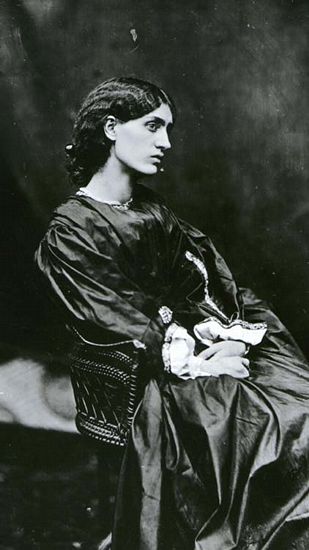
Jane Morris
The images on this page are those of the pre-Raphaelite models Jane Burden
Morris and her daughter May Morris; Effie Gray Millais and her sisters Sophie
Gray and Alice Gray; Tryphena Ford Hughes; Fanny Cornforth; Annie Miller; Ellen
Smith; Alexa Wilding; Beatrice Rose Stella Tanner; Christina Rossetti and Elizabeth Siddal Rossetti
—
the latter an artist and poet who may have been
the inspiration for the female vampire Lucy Westenra in Bram Stoker's novel
Dracula. Elizabeth Siddal's poems appear on this page, along with her
haunting life (and death) story. These women may have been
the first supermodels (the BBC called Elizabeth Siddal "art's greatest
supermodel") at a time when photography was just "developing" and they may also have served as models for striking
female vampires in the earliest novels and poems of the genre. The photos and
paintings on this page will demon-strate why, please pardon the puns ...
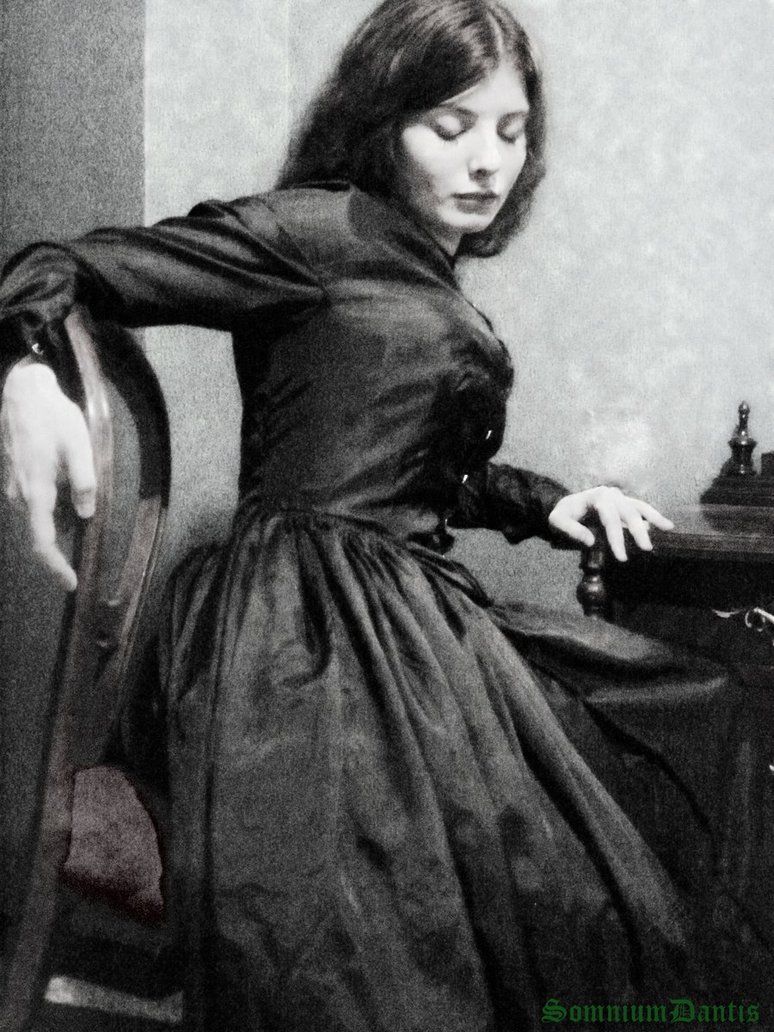
Elizabeth Siddal Rossetti
My Top Ten Vampire Poems of All Time
"Lamia" by John Keats
"Lenore" and
"Ulalume" by Edgar Allan Poe
"Christabel"
by Samuel Taylor Coleridge
"The Giaour"
by George Gordon, Lord Byron
"Luke Havergal"
by Edward Arlington Robinson
"La Belle Dame sans Merci" by John Keats
"The Vampire" by Rudyard Kipling
"The Vampire"
by Conrad Aiken
"The Rime of the Ancient Mariner"
by Samuel Taylor Coleridge
"The Highwayman" by Alfred Noyes (perhaps the best poetic ghost story of all
time)
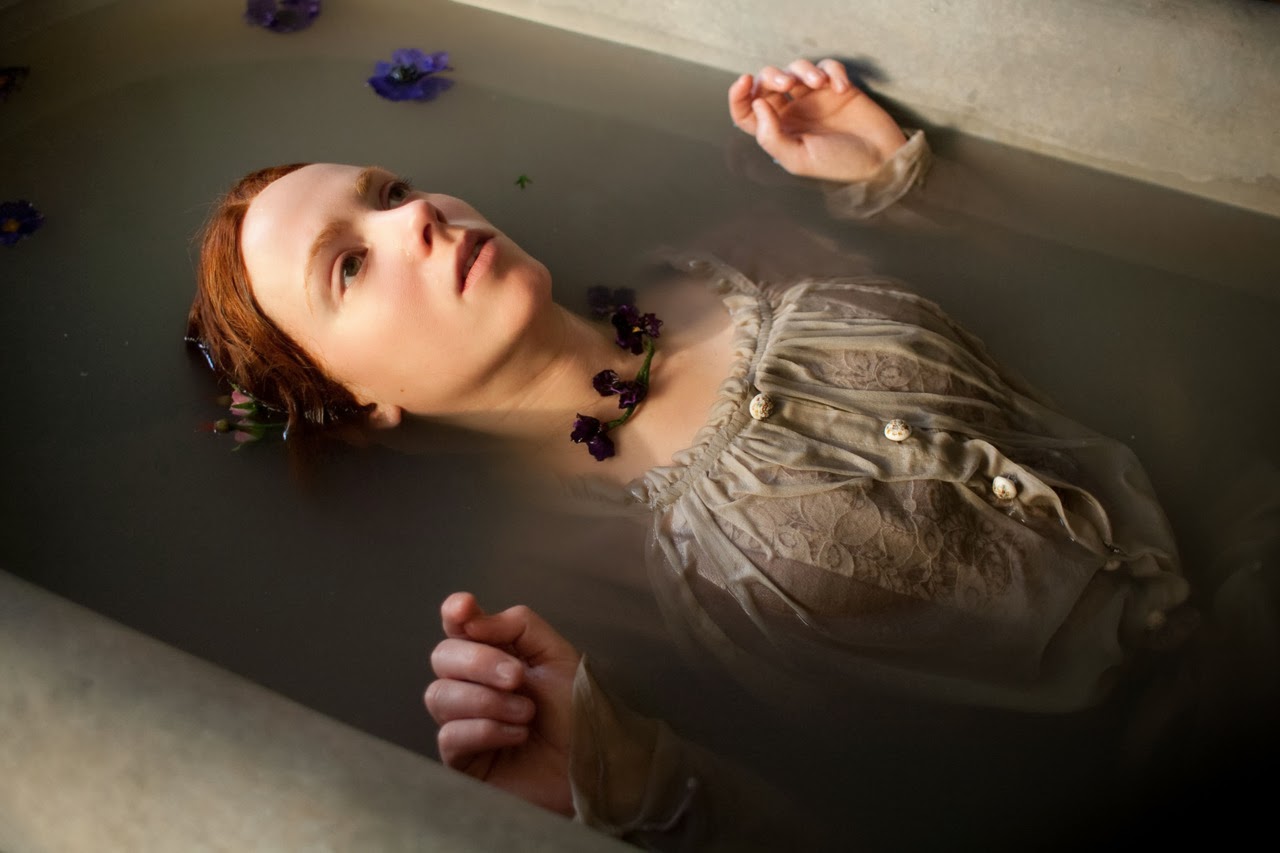
Elizabeth Siddal, modeling in a bathtub as Ophelia for John Everett Millais,
circa 1851-1852, caught a severe chill when the candles warming the tub went out
and the engrossed artist failed to notice, but she recovered and went on to
marry Millais' friend and fellow artist, Dante Gabriel Rossetti.
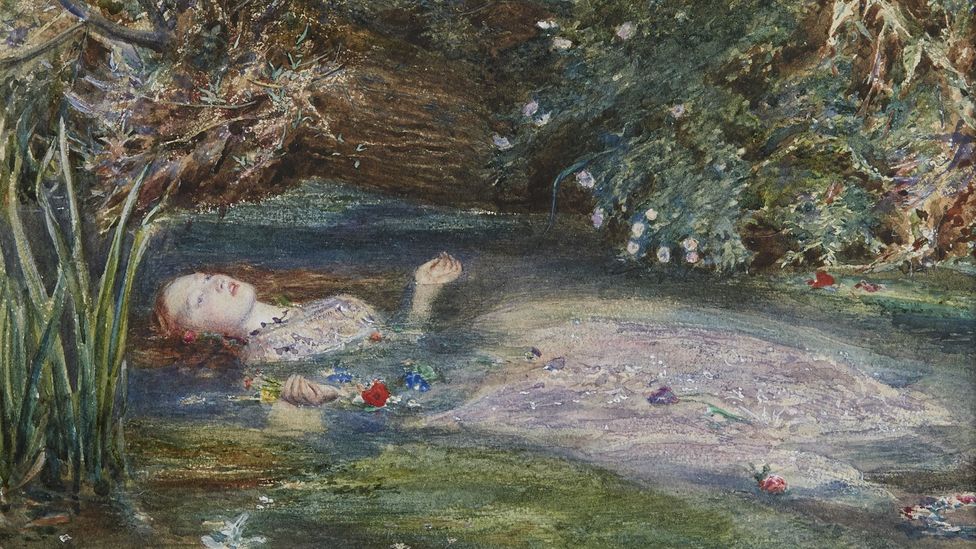
Ophelia, by John Everett Millais, circa 1851-1852, modeled by Elizabeth Siddal
without a stunt double
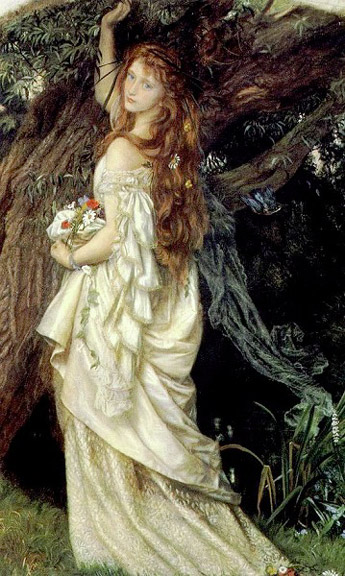
Ophelia by Arthur Hughes, possibly modeled by Tryphena Ford Hughes, circa 1863
Pale Though Her Eyes
by
Michael R. Burch
Pale though her eyes,
her lips are scarlet
from drinking our blood,
this child, this harlot
born of the night
and her heart, of darkness,
evil incarnate
to dance so reckless,
dreaming of blood,
her fangs—white—baring,
revealing her lust,
and her eyes, pale, staring ...
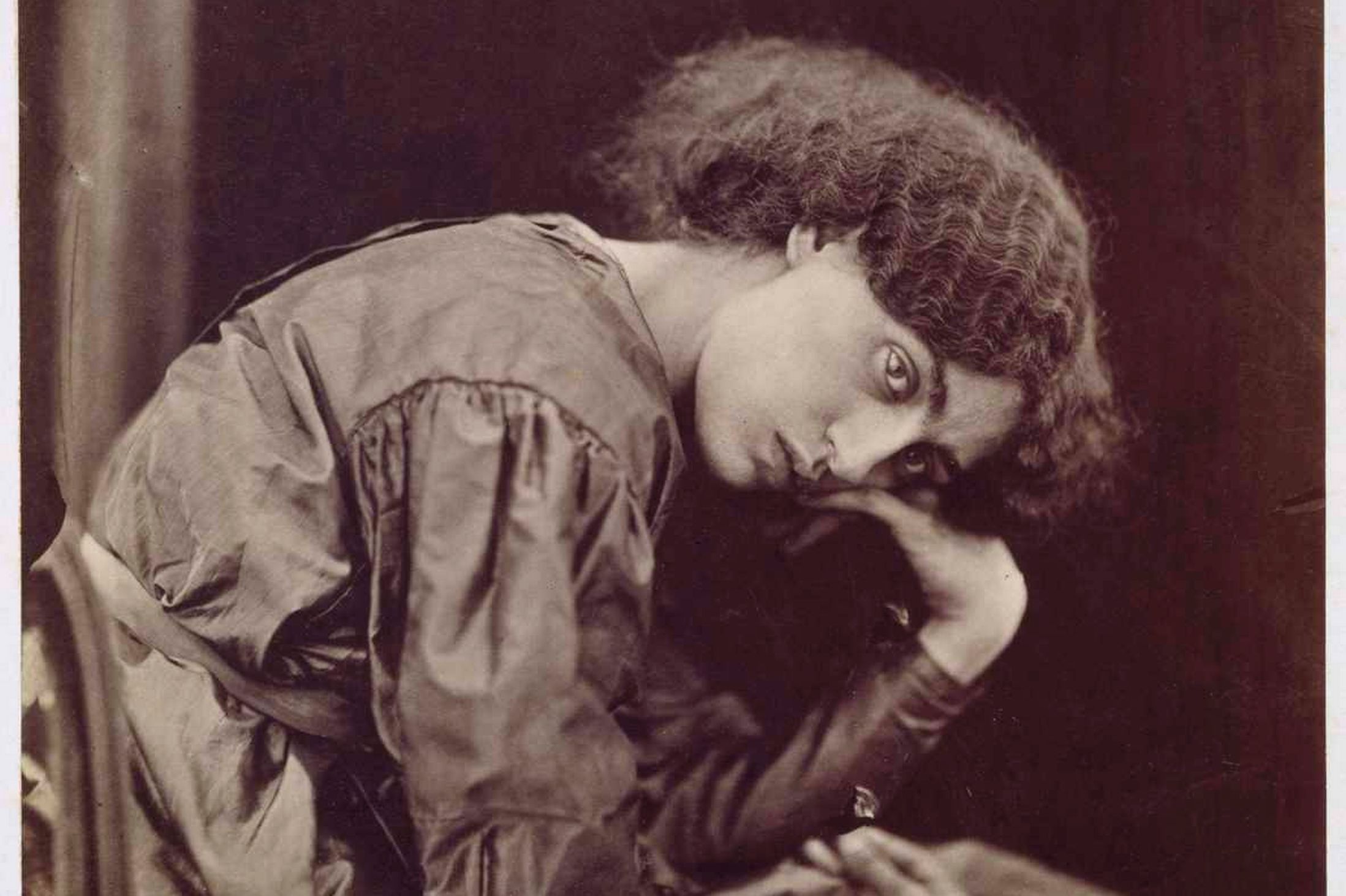
Jane Morris
Honorable Mention Poems: "Les Metamorphoses du Vampire" and "Le
Vampire" by Charles Baudelaire, "Lenore/Lenora" by Gottfried
August Bürger as translated by Dante Gabriel Rossetti, "Der Vampire" by Heinrich
August Eckenfelder, "Do Not Stand at My Grave and Weep" by Mary Elizabeth Frye,
"La Morte Amoureuse" by Theophile Gautier, "The
Vampire" by Jacques Leclercq, "The Vampyre" by James Clerk Maxwell,
"The Unreturning" by Wilfred Owen, "Thalaba the Destroyer" by Robert Southey, "The Vampyre"
by John Stagg, "The Vampyre of the Fens" by Unknown, "Oil and Blood" by
William Butler Yeats, and William Wordsworth's Leech Gatherer in "Resolution and
Independence"
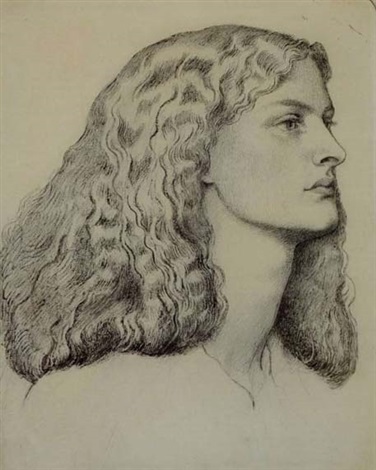
Annie Miller, in a portrait by Dante Gabriel Rossetti
Oil and Blood
by William Butler Yeats
In tombs of gold and lapis lazuli
Bodies of holy men and women exude
Miraculous oil, odour of violet.
But under heavy loads of trampled clay
Lie bodies of the vampires full of blood;
Their shrouds are bloody and their lips are wet.
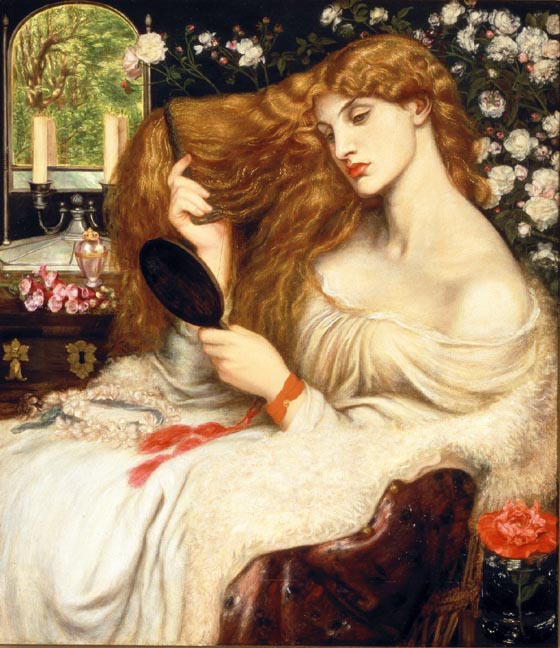
Fanny Cornforth, as painted by Dante Gabriel Rossetti in Lady Lilith, 1873
Vampires in
Prose: Bram Stoker's Dracula, Mary Shelley's Frankenstein,
Edgar Allan Poe's Oval Portrait, Oscar Wilde's The Picture of
Dorian Gay, Emily Bronte's Wuthering Heights, Henry James's
Sacred Fount, Stephen King's Salem's Lot, Anne Rice's Lestat
and other vampire
novels, Richard Matheson's I Am Legend, the Bible's Christ (human
beings eat his flesh, drink his blood, and live forever!)
Real-Life Vampires: Vlad Tepes II was known as "Vlad the Impaler" and "Dracul."
His son, Vlad III, would be known by the diminutive "Drăculea" or the anglicized
"Dracula." Elizabeth Bathory, a Hungarian countess, has also been proposed as a
female vampire. She has been deemed to be the most prolific female murderer, by
the Guinness Book of World Records. There are accounts that she bathed in the
blood of her victims in an attempt to remain young. She has been called the
Blood Countess and Countess Dracula.
History:
According to Dracula: Sense and Nonsense by Elizabeth Miller, in 1890 the
novelist Bram Stoker read a book about the bloody lords of Wallachia, part of
present-day Romania and adjacent to Transylvania. Although the book did not
mention Vlad III by name, Stoker was struck by the word "Dracula." He wrote in
his notes: "in Wallachian language means DEVIL." It is therefore possible that
Stoker chose to name his character Dracula for the word's devilish
associations. The name Dracula means "Son of the Dragon." Vlad III was said
to have dipped his bread in the blood of his victims, so that could be where the
legend of Wallachian blood drinkers began.
Related pages: The Best Vampire Poetry,
The Best Dark Poetry,
The Best Dark Christmas Poems,
The Best Halloween Poetry,
The Best Supernatural Poetry,
The Best Elegies, Dirges & Laments
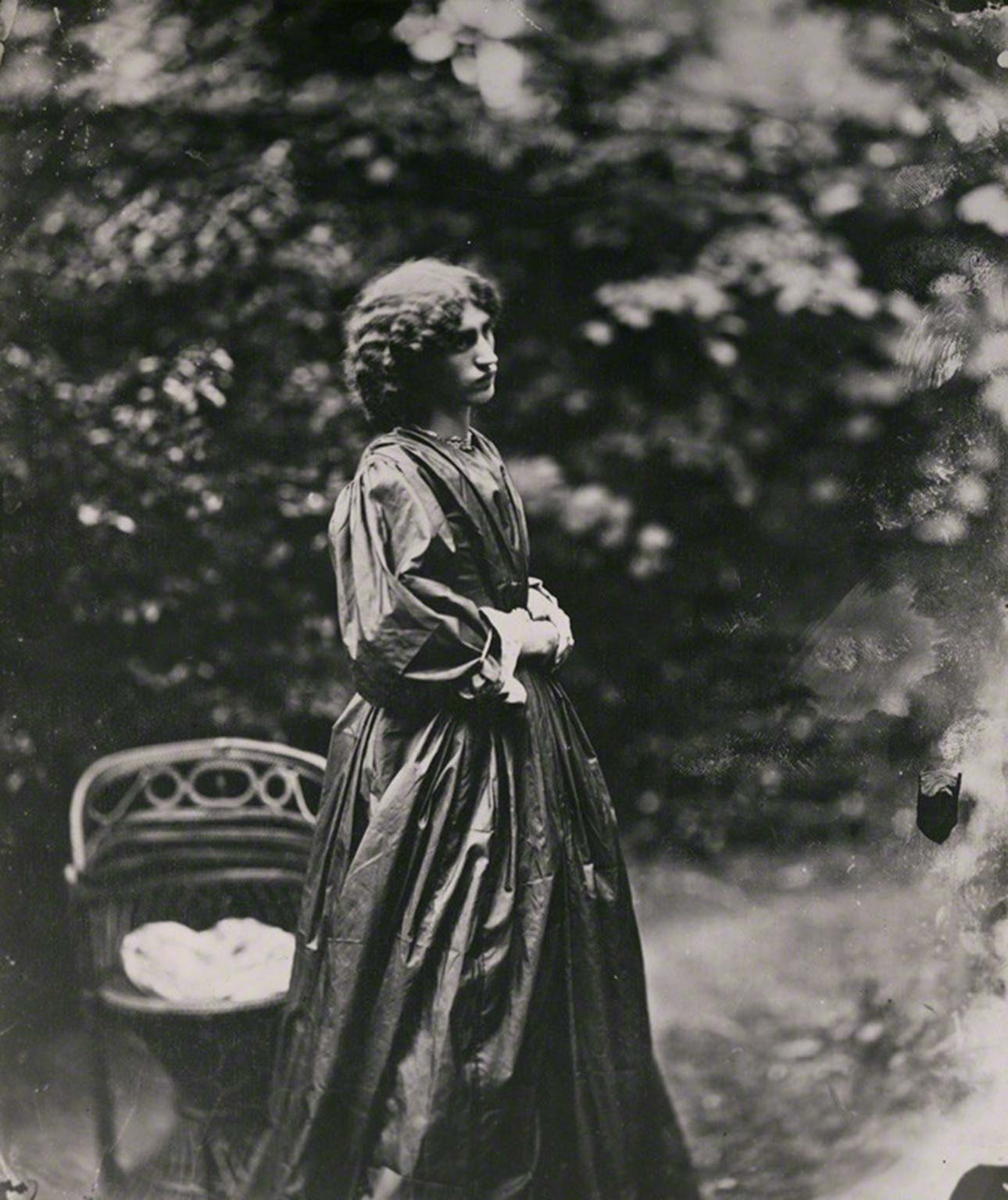
Jane Morris looking haunted and haunting ...
A Last Word
by Ernest Dowson
Let us go hence: the night is now at hand;
The day is overworn, the birds all flown;
And we have reaped the crops the gods have sown;
Despair and death; deep darkness o'er the land,
Broods like an owl; we cannot understand
Laughter or tears, for we have only known
Surpassing vanity: vain things alone
Have driven our perverse and aimless band.
Let us go hence, somewhither strange and cold,
To Hollow Lands where just men and unjust
Find end of labour, where's rest for the old,
Freedom to all from love and fear and lust.
Twine our torn hands! O pray the earth enfold
Our life-sick hearts and turn them into dust.
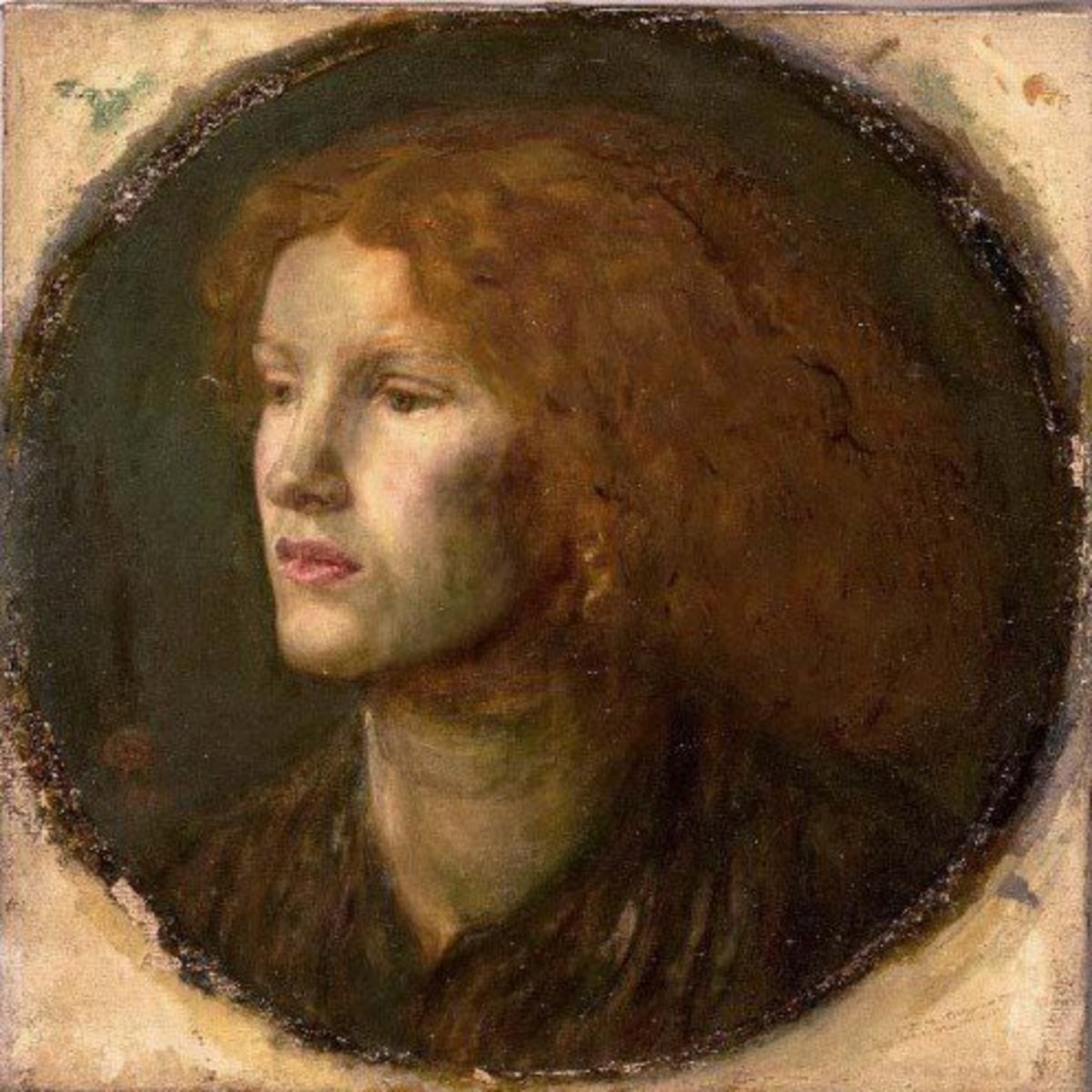
Fanny Cornforth
This poem imagines a modern-day "Goth girl" as a vampire ...
Dark Gothic
by
Michael R. Burch
Her fingers are filed into talons;
she smiles with carnivorous teeth ...
You ask, “Are there vampires?”
Get real!
(Yet she has my belief.)
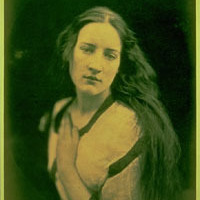
Sleep and Liberation―the Opiate World of Elizabeth
Siddal
Ulalume: A Ballad [excerpt]
by Edgar Allan Poe
The skies they were ashen and sober;
The leaves they were crisped and sere—
The leaves they were withering and sere;
It was night in the lonesome October
Of my most immemorial year:
It was hard by the dim lake of Auber,
In the misty mid region of Weir—
It was down by the dank tarn of Auber,
In the ghoul-haunted woodland of Weir ...
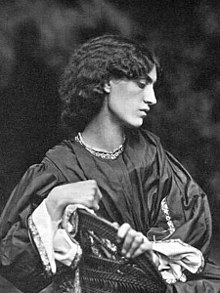
Jane Burden and her sister Elizabeth Burden, also known as Bessie Burden,
both modeled for the Oxford Union murals, which were painted by pre-Raphaelite
artists William Morris, Dante Gabriel Rossetti and Edward Burne-Jones, among
others. Jane Burden married William Morris and is best known today as Jane
Morris.
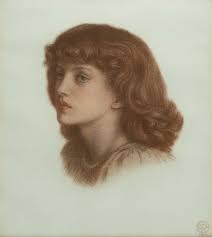
May Morris, the daughter of the artist William Morris and his wife, Jane Burden
Morris
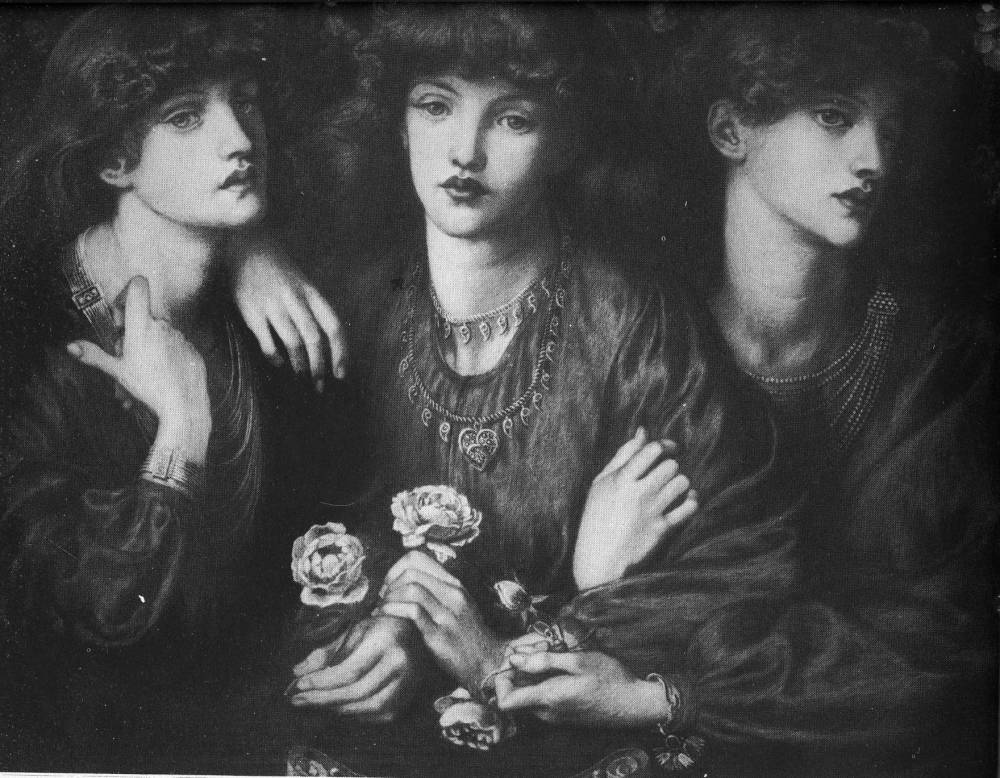
Rosa Triplex by Dante Gabriel Rossetti, 1874, a triple portrait of May Morris
Here's something you don't see every day: just in time for Halloween, a vampire
poem that I wrote many years ago has gone viral ... on a French website ... in
an Anglais book ... read by someone with a "burry" Scottish voice! So we have an
American poet, a Scottish performer, an English book, and
a French bookstore website. The poem is its own ecumenical movement! If
you'd like to hear the poem read, please click on this
link then scroll down and click on "Poem written by Michael R. Burch" (the
poem appears below in the text version).
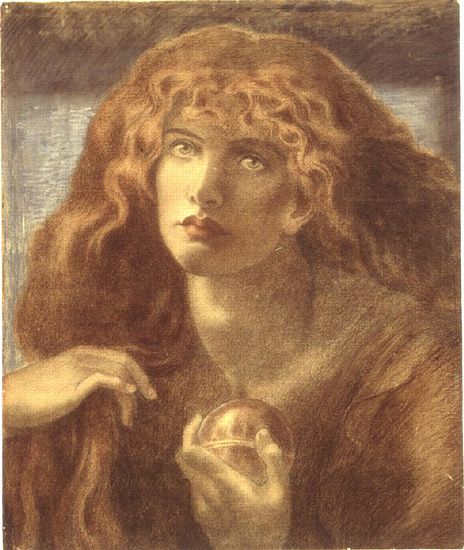
Mary Magdalene, by Dante Gabriel Rossetti, modeled by Alexa Wilding, circa
1867
Vampires
by
Michael R. Burch
Vampires are such fragile creatures;
we dread the dark, but the light destroys them ...
sunlight, or a stake, or a cross—such common things.
Still, late at night, when the bat-like vampire sings,
we shrink from his voice.
Centuries have taught us:
in shadows danger lurks for those who stray,
and there the vampire bares his yellow fangs
and feels the ancient soul-tormenting pangs.
He has no choice.
We are his prey, plump and fragrant,
and if we pray to avoid him, the more he prays to find us ...
prays to some despotic hooded God
whose benediction is the humid blood
he lusts to taste.
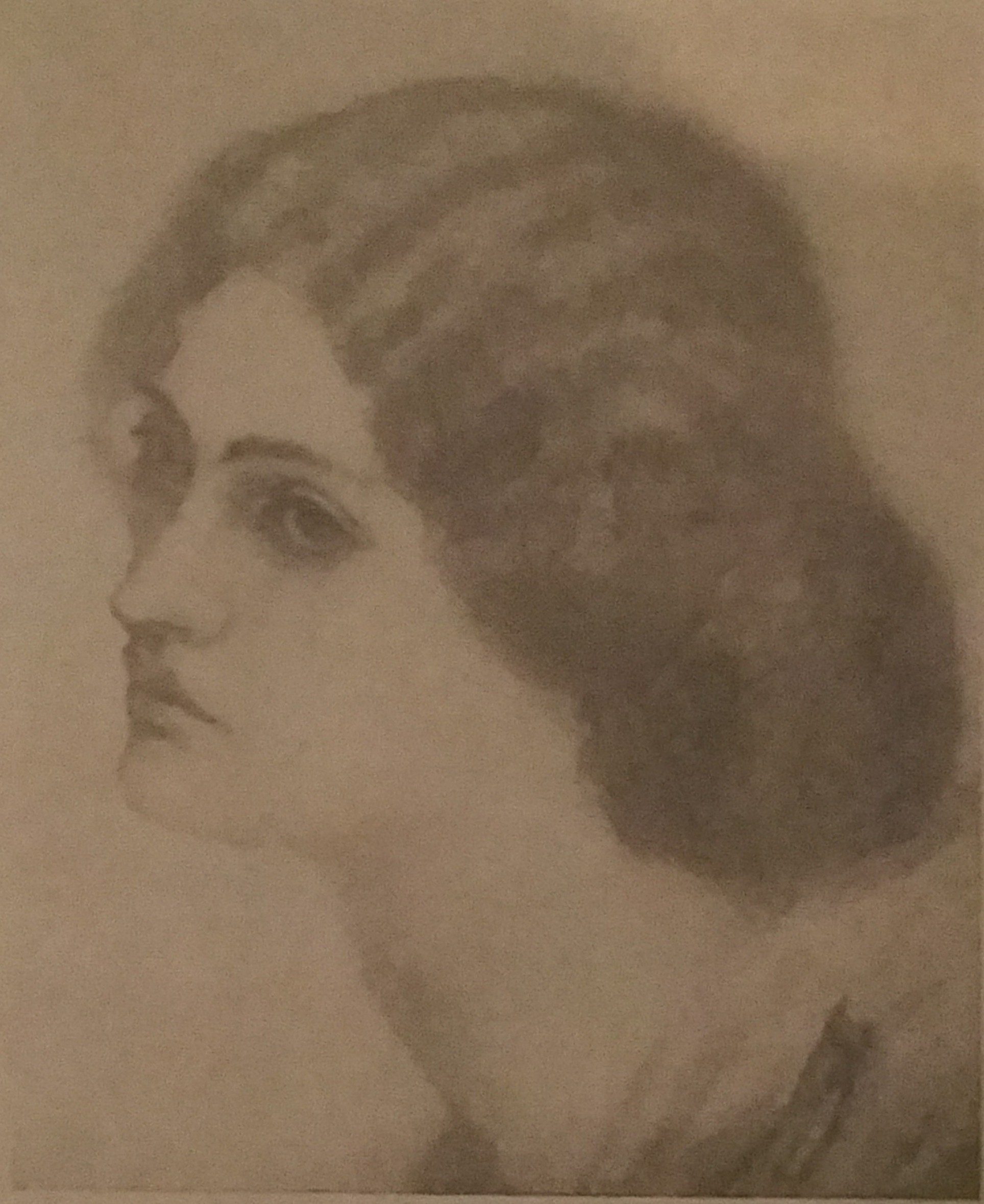
Jane Burden Morris, in a portrait by her husband William Morris
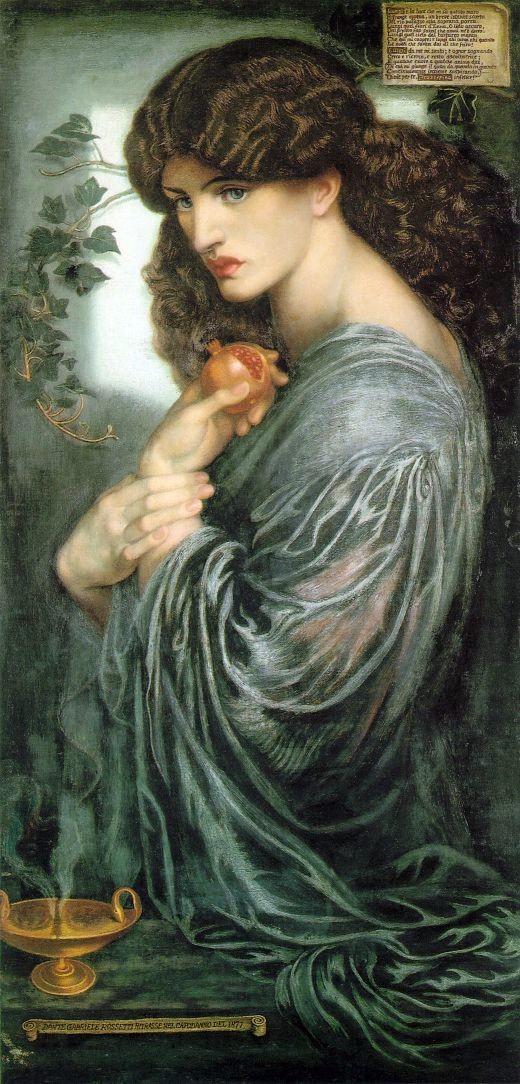
Jane Morris, as painted by Dante Gabriel Rossetti in Proserpine, 1874
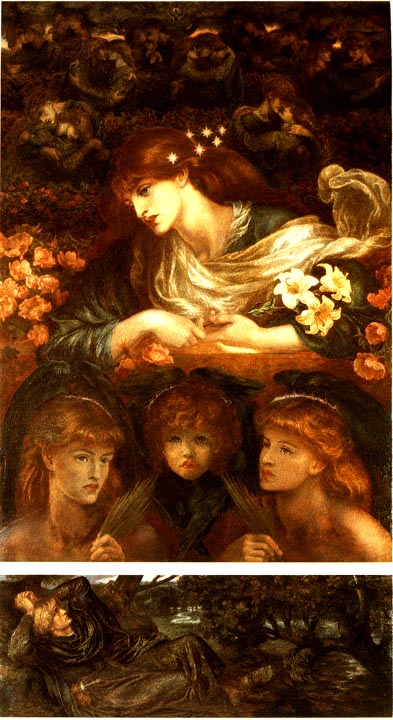
The Blessed Damozel, by Dante Gabriel Rossetti, 1879, modeled by Alexa Wilding,
who was also the model for Aspecta Medusa (their first collaboration), Mary
Magdalene, Monna Vanna, Veronica Veronese, and The Bower Meadow, among many
others.
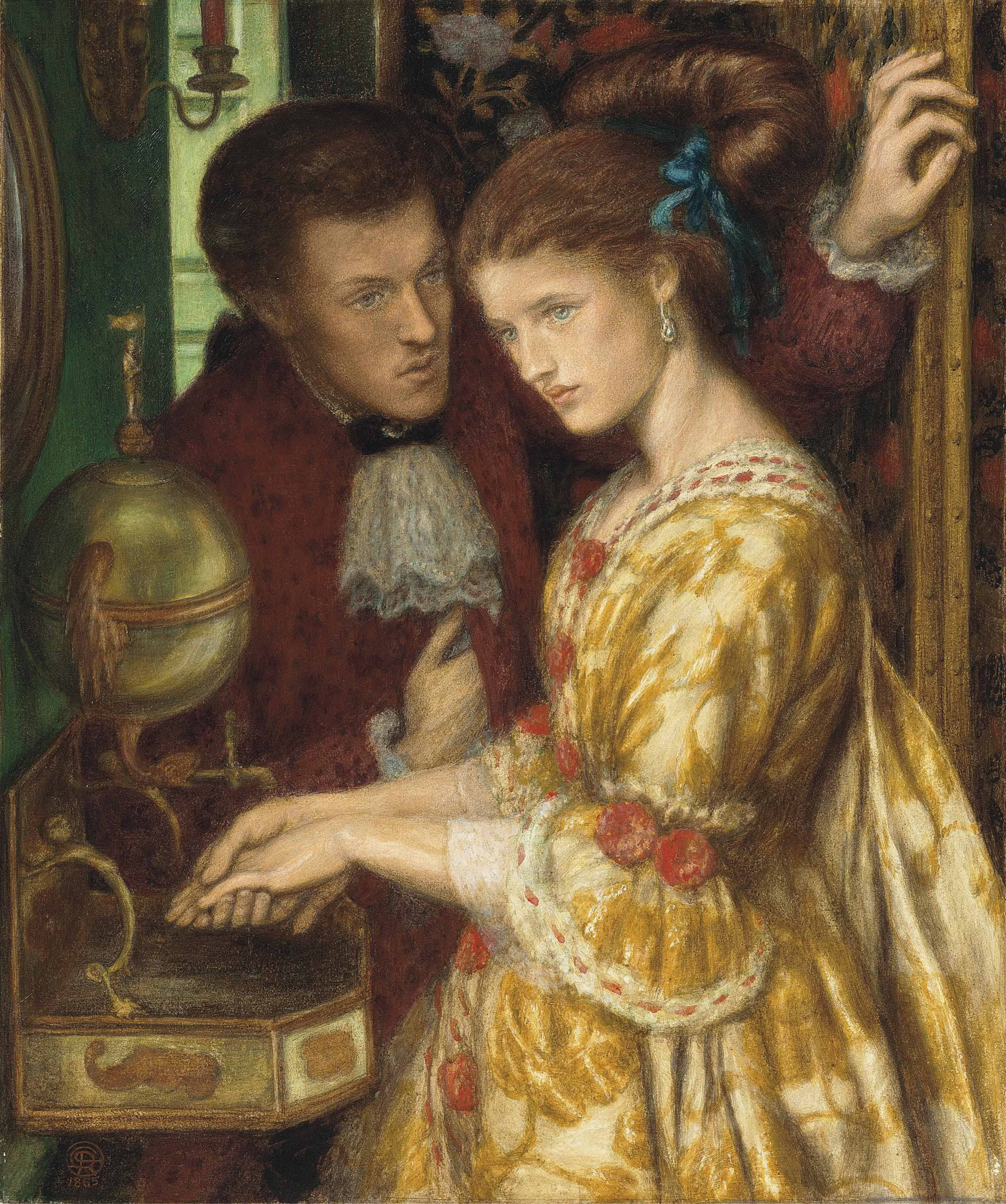
Ellen Smith modeled for Dante Gabriel Rossetti's painting Washing Hands (above)
and also for The Loving Cup, A Christmas Carol, The Beloved, and Joli Coeur.
Fragment of a Ballad
by Elizabeth Siddal
Many a mile over land and sea
Unsummoned my love returned to me;
I remember not the words he said
But only the trees moaning overhead.
And he came ready to take and bear
The cross I had carried for many a year,
But words came slowly one by one
From frozen lips shut still and dumb.
How sounded my words so still and slow
To the great strong heart that loved me so,
Who came to save me from pain and wrong
And to comfort me with his love so strong?
I felt the wind strike chill and cold
And vapours rise from the red-brown mould;
I felt the spell that held my breath
Bending me down to a living death.
In the winter of 1849-1850, the artists Dante Gabriel Rossetti and William
Holman Hunt were painting together, when Walter Howell Deverell burst into their
studio, exclaiming excitedly: “You fellows can’t tell what a stupendously
beautiful creature I have found… She’s like a queen, magnificently tall!” The
rest, as they say, is art history...
ELIZABETH SIDDAL
Elizabeth Eleanor Siddal (1829-1862), in addition to having been a poet and artist, may have
been the first supermodel. Was she also the first female vampire?
Lizzie Siddal developed a love for poetry at a young age, after having discovered a
Tennyson poem on a scrap of newspaper that had been used to wrap a pat of
butter; the discovery was an inspiration for her to start writing her own poems.
Around 1849 at age 20, she was employed as an artist's model by Walter Howell Deverell and
through him was introduced to the other Pre-Raphaelites, including her future
husband, Dante Gabriel Rossetti. Her first modeling job was to sit as Viola for
Deverell's "Twelfth Night" painting. She also posed as Ophelia, painted by Sir
John Everett Millais.
William Michael Rossetti, her brother-in-law, described her as
"a most beautiful creature with an air between dignity and sweetness with
something that exceeded modest self-respect and partook of disdainful reserve;
tall, finely-formed with a lofty neck and regular yet somewhat uncommon
features, greenish-blue unsparkling eyes, large perfect eyelids, brilliant
complexion and a lavish heavy wealth of coppery golden hair."
By 1851, she had
become the primary model and muse of Dante Gabriel Rossetti, and also his star
pupil. In 1855, John Ruskin, the leading art critic of the Victorian era,
purchased all her work, declaring it better than her male counterparts', and
became her patron. In 1857, several of her paintings and illustrations appeared
in the Pre-Raphaelite Exhibition at Fitzroy Square, Marylebone, where she was
the only female artist.
Dante and Elizabeth married in
1860. She overdosed on laudanum in 1862, possibly a
suicide, after having dinner with the poet Algernon Charles Swinburne and her
husband. Dante, overcome with grief, placed the journal containing the
only copies of many of his poems in her coffin. Seven years later, in 1869, her
grave was exhumed so that the poems could be retrieved. Her hair was said to
have continued to grow after death so that the coffin was filled with her
flowing coppery hair. Although a worm had burrowed through the book so that some
of the poems were difficult to read, it was reported that her body had remained
uncorrupted. It was this report of Elizabeth's unblemished "undead" appearance
that has been alleged to have inspired Bam Stoker―a
neighbor of the Rossettis―to
conceive of the character of Lucy Westenra for his famous novel Dracula. It has also been
suggested that Lucy's tomb at the fictional Kingstead Cemetery was largely based
on Highgate Cemetery where Elizabeth was laid to rest.
In any case, Dante
did publish the recovered poems along with his newer ones;
they were not well received by some critics because of their eroticism, and he
was haunted by the exhumation for the rest of his life. Ironically, John William Polidori, the writer of the first modern vampire story, The Vampyre,
was an uncle of the three most famous Rossettis: Dante, William
and Christina.
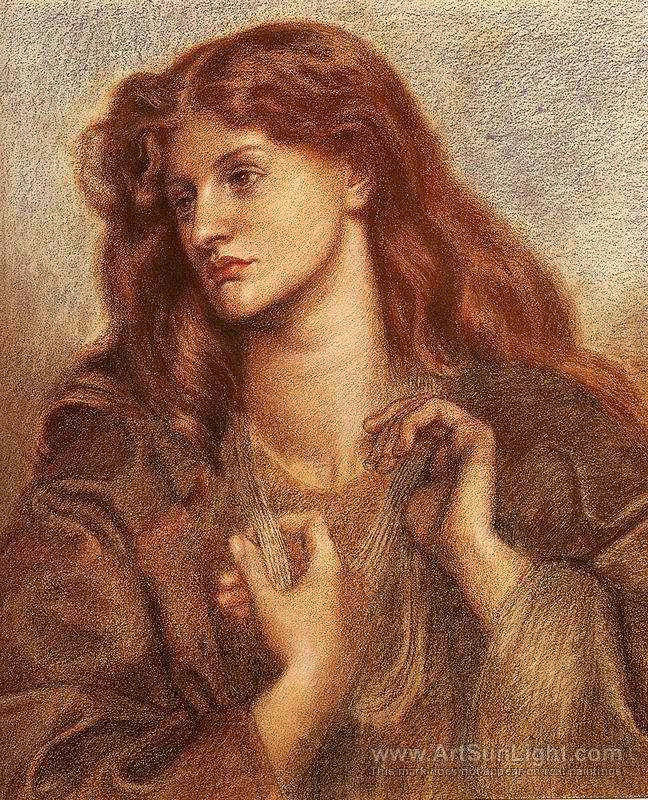
Elizabeth Siddal as she might have appeared in her grave, with coppery hair
that continued to grow even after her demise.
At Last
by Elizabeth Siddal
O mother, open the window wide
And let the daylight in;
The hills grow darker to my sight
And thoughts begin to swim.
And mother dear, take my young son,
(Since I was born of thee)
And care for all his little ways
And nurse him on thy knee.
And mother, wash my pale pale hands
And then bind up my feet;
My body may no longer rest
Out of its winding sheet.
And mother dear, take a sapling twig
And green grass newly mown,
And lay them on my empty bed
That my sorrow be not known.
And mother, find three berries red
And pluck them from the stalk,
And burn them at the first cockcrow
That my spirit may not walk.
And mother dear, break a willow wand,
And if the sap be even,
Then save it for sweet Robert’s sake
And he’ll know my soul’s in heaven.
And mother, when the big tears fall,
(And fall, God knows, they may)
Tell him I died of my great love
And my dying heart was gay.
And mother dear, when the sun has set
And the pale kirk grass waves,
Then carry me through the dim twilight
And hide me among the graves.
Like Angels, Winged
by
Michael R. Burch
Like angels—winged,
shimmering, misunderstood—
they flit beyond our understanding
being neither evil, nor good.
They are as they are ...
and we are their lovers, their prey;
they seek us out when the moon is full
and dream of us by day.
Their eyes—hypnotic, alluring—
trap ours with their strange appeal
till like flame-drawn moths we gather ...
to see, to touch, to feel.
Held in their arms, enchanted,
we feel their lips, so old!,
till with their gorging kisses
we warm them, growing cold.
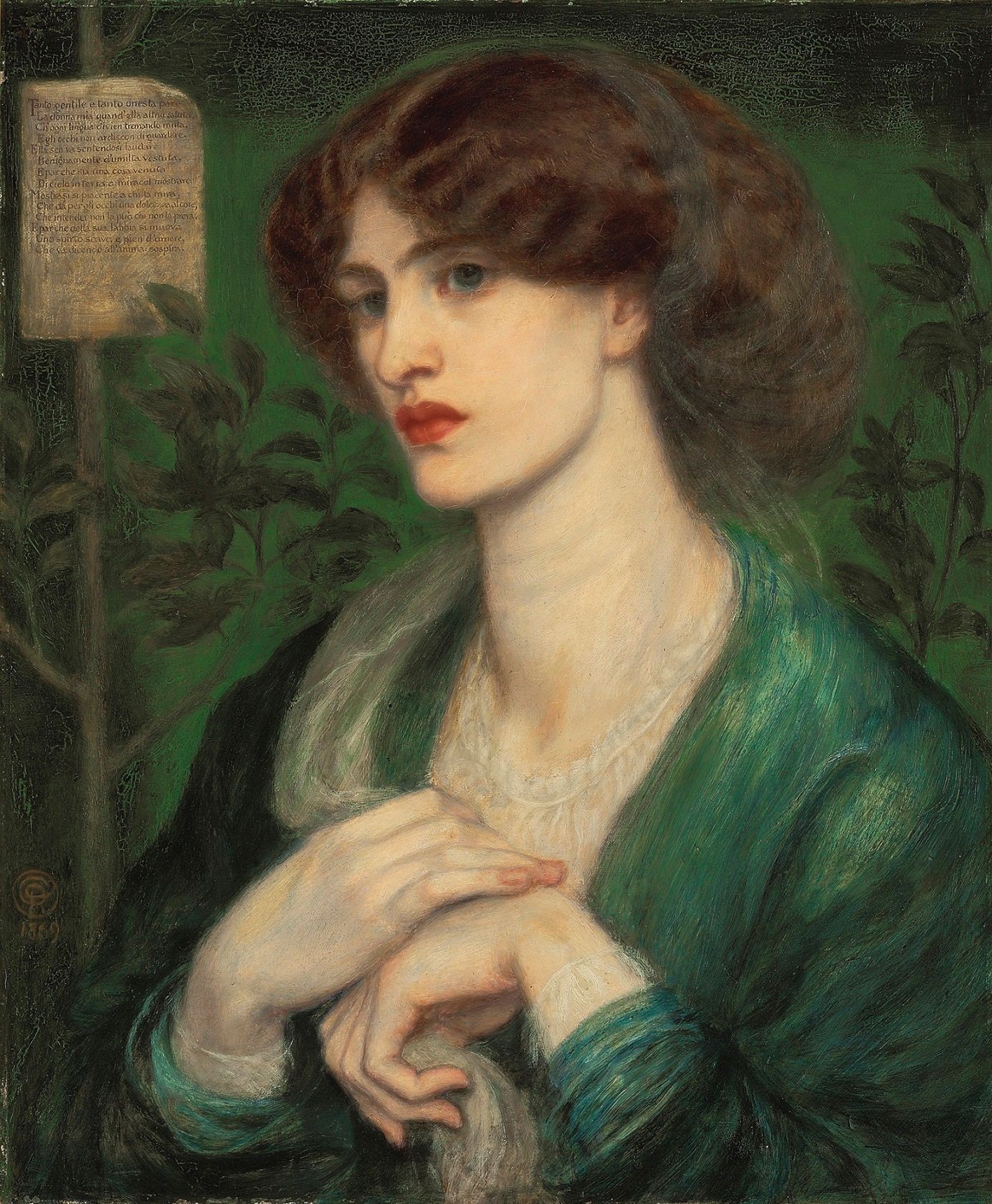
Elizabeth Siddal, as painted by Dante Gabriel Rossetti
Early Death
by Elizabeth Siddal
Oh grieve not with thy bitter tears
The life that passes fast;
The gates of heaven will open wide
And take me in at last.
Then sit down meekly at my side
And watch my young life flee;
Then solemn peace of holy death
Come quickly unto thee.
But true love, seek me in the throng
Of spirits floating past,
And I will take thee by the hands
And know thee mine at last.
Solicitation
by
Michael R. Burch
He comes to me out of the shadows, acknowledging
my presence with a tip of his hat, always the gentleman,
and his eyes are on mine like a snake’s on a bird’s—
quizzical, mesmerizing.
He cocks his head as though something he heard intrigues him
(although I hear nothing) and he smiles, amusing himself at my expense;
his words are full of desire and loathing, and while I hear
everything,
he says nothing I understand.
The moon shines—maniacal, queer—as he takes my hand whispering
Our time has come ... And so we stroll together creaking docks
where the sea sends sickening things
scurrying under rocks and boards.
Moonlight washes his ashen face as he stares unseeing
into my eyes.
He sighs, and the sound crawls slithering down my spine;
my blood seems to pause at his touch as he caresses my face.
He unfastens my dress till the white lace shows, and my neck is bared.
His teeth are long, yellow and hard, his face bearded and haggard.
A wolf howls in the distance. There are no wolves in New York. I gasp.
My blood is a trickle his wet tongue embraces. My heart races madly.
He likes it like that.
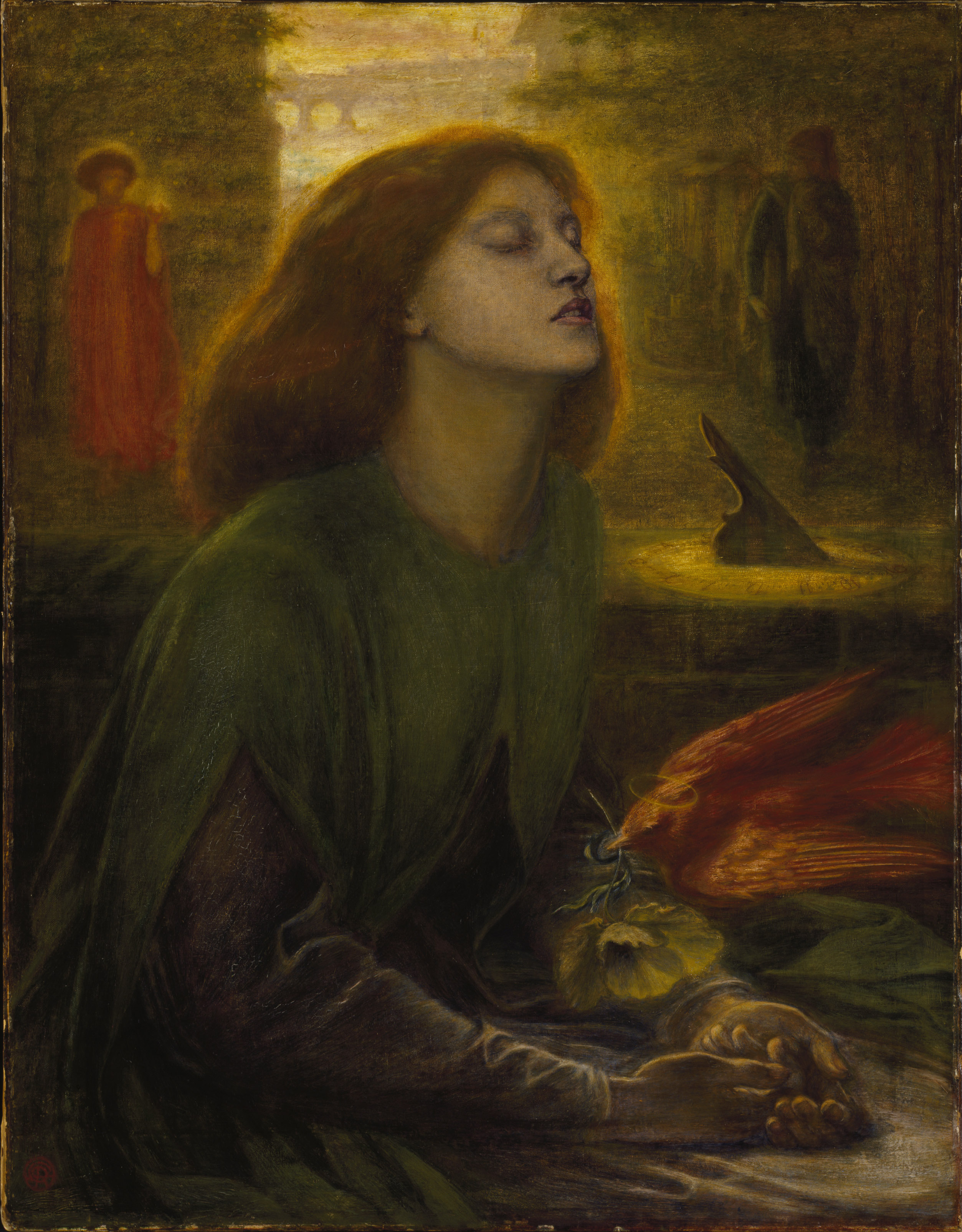
Elizabeth Siddal, as painted by Dante Gabriel Rossetti in a memorial after
her death, in Beata Beatrix, 1863. She was also the model for the watercolor The
First Anniversary of the Death of Beatrice (their first collaboration), Il
saluto di Beatrice, The Return of Tibullus to Delia, Regina Cordium ("The Queen
of Hearts"), Lady Clare, St. George and the Princess Sabra (their last public
collaboration) and hundreds of other paintings and sketches by her husband.
Gone
by Elizabeth Siddal
To touch the glove upon her tender hand,
To watch the jewel sparkle in her ring,
Lifted my heart into a sudden song
As when the wild birds sing.
To touch her shadow on the sunny grass,
To break her pathway through the darkened wood,
Filled all my life with trembling and tears
And silence where I stood.
I watch the shadows gather round my heart,
I live to know that she is gone.
Gone gone for ever, like the tender dove
That left the Ark alone.
Sometimes the Dead
by Michael R. Burch
Sometimes we catch them out of the corners of our eyes—
the pale dead.
After they have fled
the gourds of their bodies, like escaping fragrances they rise.
Once they have become a cloud’s mist, sometimes like the rain
they descend;
they appear, sometimes silver like laughter,
to gladden the hearts of men.
Sometimes like a pale gray fog, they drift
unencumbered, yet lumbrously,
as if over the sea
there was the lightest vapor even Atlas could not lift.
Sometimes they haunt our dreams like forgotten melodies
only half-remembered.
Though they lie dismembered
in black catacombs, sepulchers and dismal graves; although they have committed
felonies,
yet they are us. Someday soon we will meet them in the graveyard dust
blood-engorged, but never sated
since Cain slew Abel.
But until we become them, let us steadfastly forget them, even as we know our
children must ...
Shepherd Turned Sailor
by Elizabeth Siddal
Now Christ ye save yon bonny shepherd
Sailing on the sea;
Ten thousand souls are sailing there
But they belong to Thee.
If he is lost then all is lost
And all is dead to me.
My love should have a grey head-stone
And green moss at his feet
And clinging grass above his breast
Whereon his lambs could bleat,
And I should know the span of earth
Where some day I might sleep.
Styx
by Michael R. Burch
Black waters,
deep and dark and still . . .
all men have passed this way,
or will.
Charon, the ferrymen who carried the dead across the River Styx to their eternal
destination, has been portrayed by artists and poets as a vampiric figure.
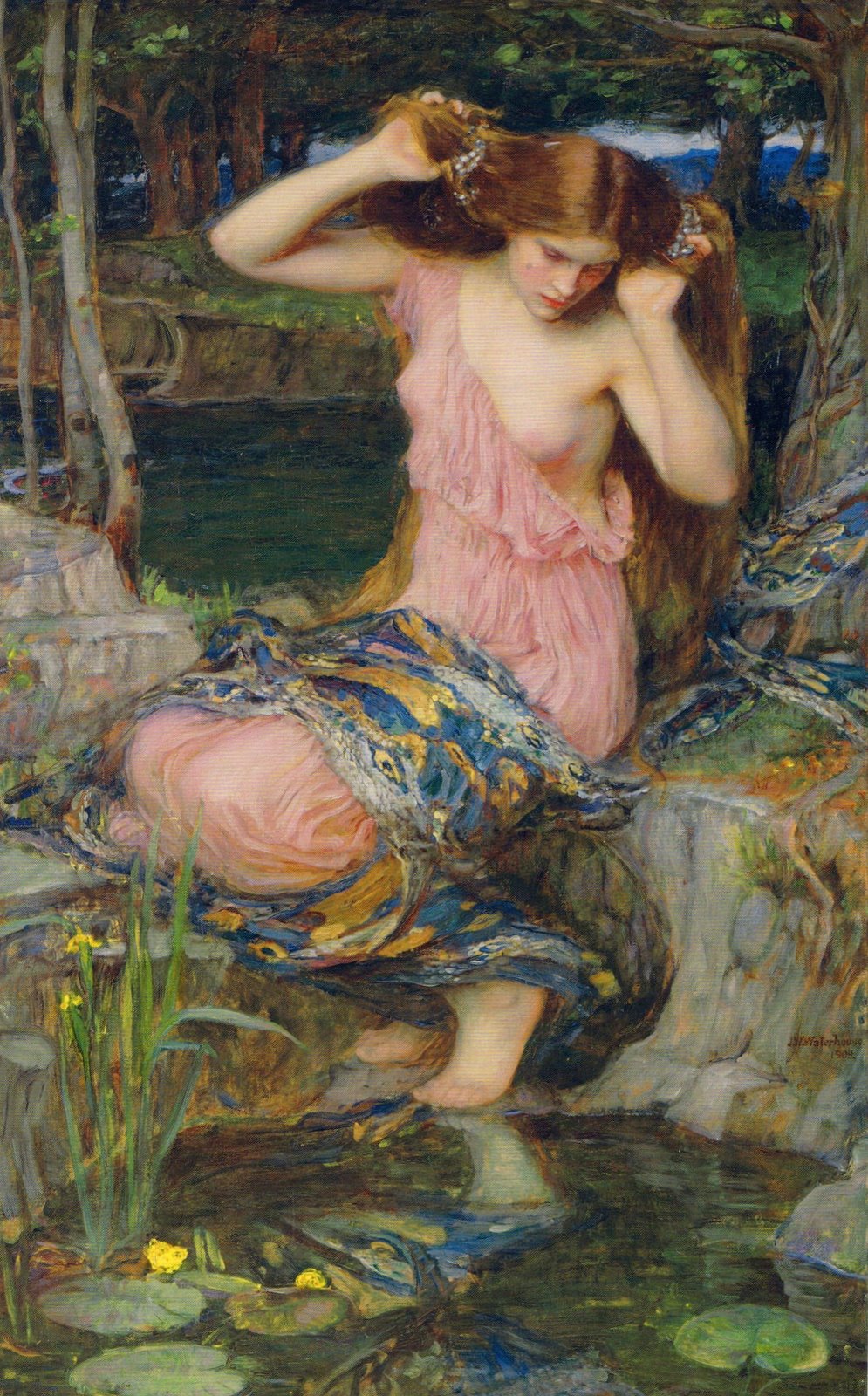
Lamia
True Love
by Elizabeth Siddal
Farewell, Earl Richard,
Tender and brave;
Kneeling I kiss
The dust from thy grave.
Pray for me, Richard,
Lying alone
With hands pleading earnestly,
All in white stone.
Soon must I leave thee
This sweet summer tide;
That other is waiting
To claim his pale bride.
Soon I’ll return to thee
Hopeful and brave,
When the dead leaves
Blow over thy grave.
Then shall they find me
Close at thy head
Watching or fainting,
Sleeping or dead.
Worn Out
by Elizabeth Siddal
Thy strong arms are around me, love
My head is on thy breast;
Low words of comfort come from thee
Yet my soul has no rest.
For I am but a startled thing
Nor can I ever be
Aught save a bird whose broken wing
Must fly away from thee.
I cannot give to thee the love
I gave so long ago,
The love that turned and struck me down
Amid the blinding snow.
I can but give a failing heart
And weary eyes of pain,
A faded mouth that cannot smile
And may not laugh again.
Yet keep thine arms around me, love,
Until I fall to sleep;
Then leave me, saying no goodbye
Lest I might wake, and weep.
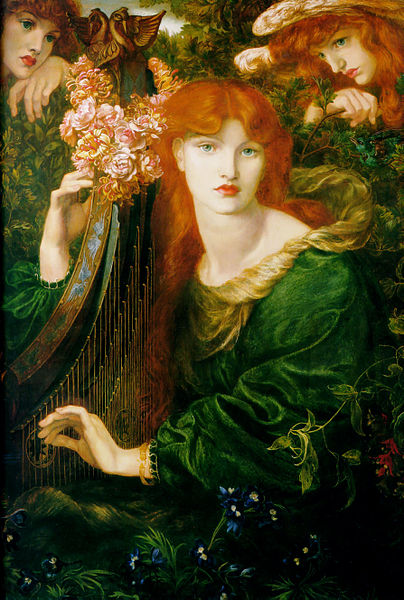
Alexa Wilding, as painted by Dante Gabriel Rossetti in La Ghirlandata, 1873
Luke Havergal
by Edward Arlington Robinson
Go to the western gate, Luke Havergal,
There where the vines cling crimson on the wall,
And in the twilight wait for what will come.
The leaves will whisper there of her, and some,
Like flying words, will strike you as they fall;
But go, and if you listen, she will call.
Go to the western gate, Luke Havergal—
Luke Havergal.
No, there is not a dawn in eastern skies
To rift the fiery night that's in your eyes;
But there, where western glooms are gathering
The dark will end the dark, if anything:
God slays Himself with every leaf that flies,
And hell is more than half of paradise.
No, there is not a dawn in eastern skies—
In eastern skies.
Out of a grave I come to tell you this,
Out of a grave I come to quench the kiss
That flames upon your forehead with a glow
That blinds you to the way that you must go.
Yes, there is yet one way to where she is,
Bitter, but one that faith may never miss.
Out of a grave I come to tell you this—
To tell you this.
There is the western gate, Luke Havergal,
There are the crimson leaves upon the wall,
Go, for the winds are tearing them away,—
Nor think to riddle the dead words they say,
Nor any more to feel them as they fall;
But go, and if you trust her she will call.
There is the western gate, Luke Havergal—
Luke Havergal.

Fanny Cornforth
Christabel [an excerpt]
by Samuel Taylor Coleridge
Beneath the lamp the lady bowed,
And slowly rolled her eyes around;
Then drawing in her breath aloud,
Like one that shuddered, she unbound
The cincture from beneath her breast:
Her silken robe, and inner vest,
Dropt to her feet, and full in view,
Behold! her bosom, and half her side—
A sight to dream of, not to tell!
O shield her! shield sweet Christabel!
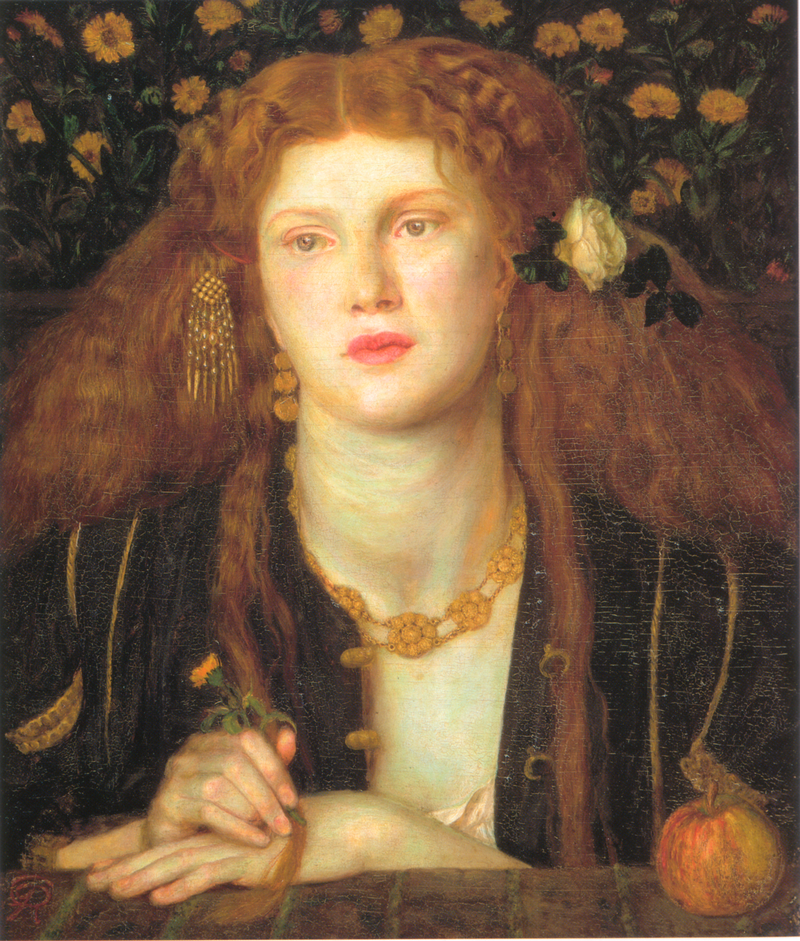
Fanny Cornforth, in Bocca Baciata ("the mouth that has been kissed") by
Daniel Gabriel Rossetti
You, Nosferatu
Or, how to passively resist a vampire
by Nick Marco
Your wings shade me
and scarce-twitch enough
to riffle the blood-drops
that fresh-congeal on
my lips and the thornless
white rose shrub
you pillow me on
I fix my stare beyond
your feral eyes on that
small cloud blanched
on blue so you’ll
believe my gaze
glass-dead
I freeze my heart
and breath so you’ll
think no life remains
in me for you
to want
but you aren’t fooled: some
face-pore of me must eke
heat enough to draw
your teeth into that
artery below
my chin
and only my last spurt of
will bitters your sluice-sips
but I’ll lie still in your
absent hum unflinching
as your leather swarm
throbs down
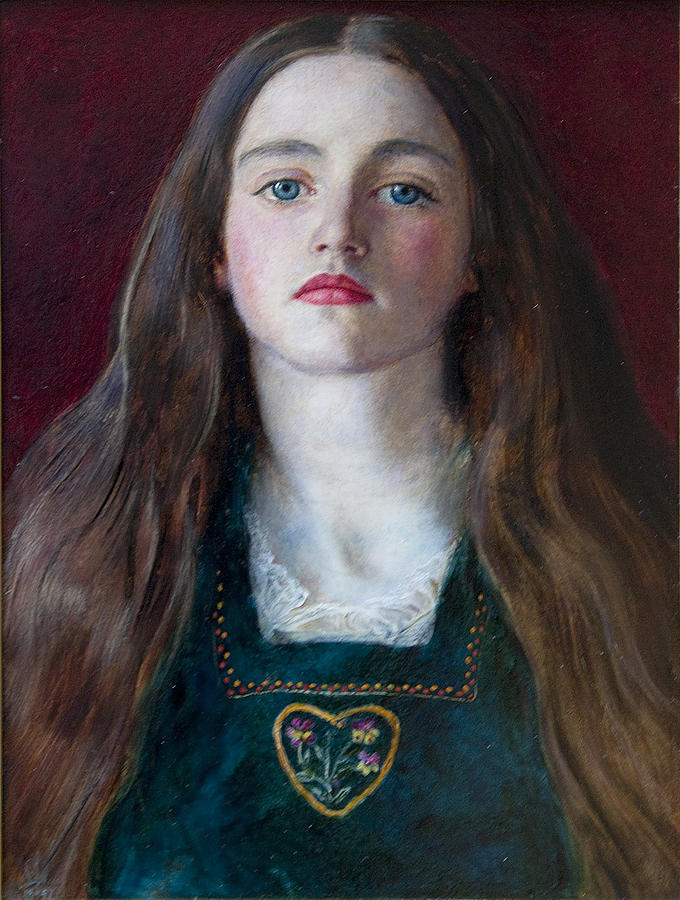
Sophia "Sophie" Gray, in Portrait of a Young Lady, 1856, by John Everett
Millais
The Vampire's Spa Day Dream
by
Michael R. Burch
O, to swim in vats of blood!
I wish I could, I wish I could!
O, 'twould be
so heavenly
to swim in lovely vats of blood!
The poem above was inspired by a Josh Parkinson depiction of Elizabeth Bathory
up to her nostrils in the blood of her victims, with their skulls floating in
the background.
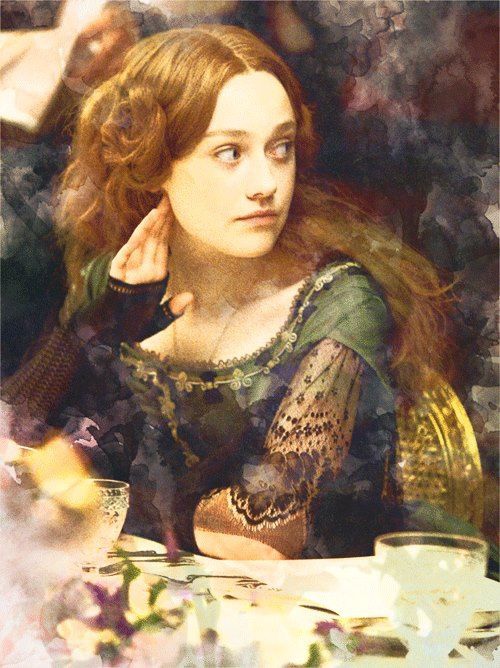
Euphemia "Effie" Gray, in a portrait by John Ruskin, whom she married only
to divorce with the relationship unconsummated after six years! She and her
sisters Sophie Gray and Alice Gray had modeled for the painter John Everett
Millais, whom she married after the divorce, and with whom she had eight
children.
The Giaour
by George Gordon, Lord Byron
... Unquenched, unquenchable,
Around, within, thy heart shall dwell;
Nor ear can hear nor tongue can tell
The tortures of that inward hell!
But first, on earth as vampire sent,
Thy corpse shall from its tomb be rent:
Then ghastly haunt thy native place,
And suck the blood of all thy race;
There from thy daughter, sister, wife,
At midnight drain the stream of life;
Yet loathe the banquet which perforce
Must feed thy livid living corpse:
Thy victims ere they yet expire
Shall know the demon for their sire,
As cursing thee, thou cursing them,
Thy flowers are withered on the stem.
But one that for thy crime must fall,
The youngest, most beloved of all,
Shall bless thee with a father's name —
That word shall wrap thy heart in flame!
Yet must thou end thy task, and mark
Her cheek's last tinge, her eye's last spark,
And the last glassy glance must view
Which freezes o'er its lifeless blue;
Then with unhallowed hand shalt tear
The tresses of her yellow hair,
Of which in life a lock when shorn
Affection's fondest pledge was worn,
But now is borne away by thee,
Memorial of thine agony!
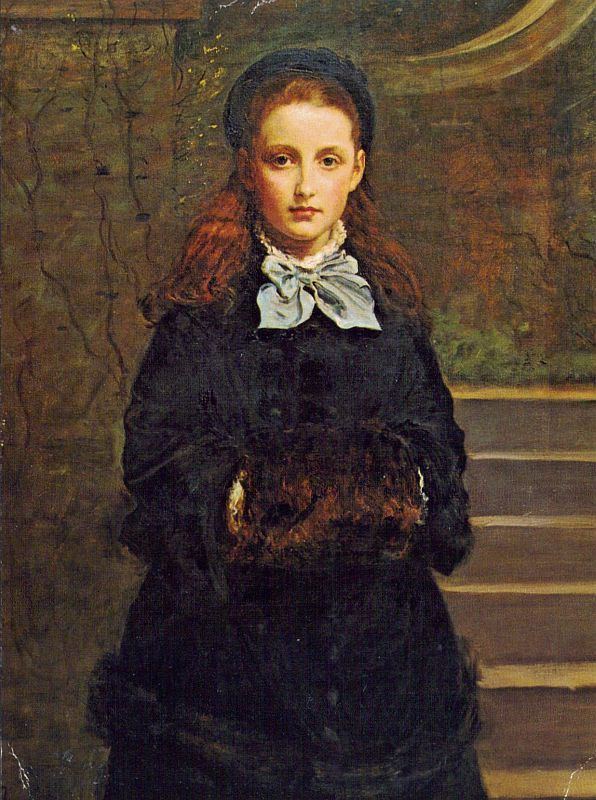
Alice Gray, in a portrait by John Everett Millais
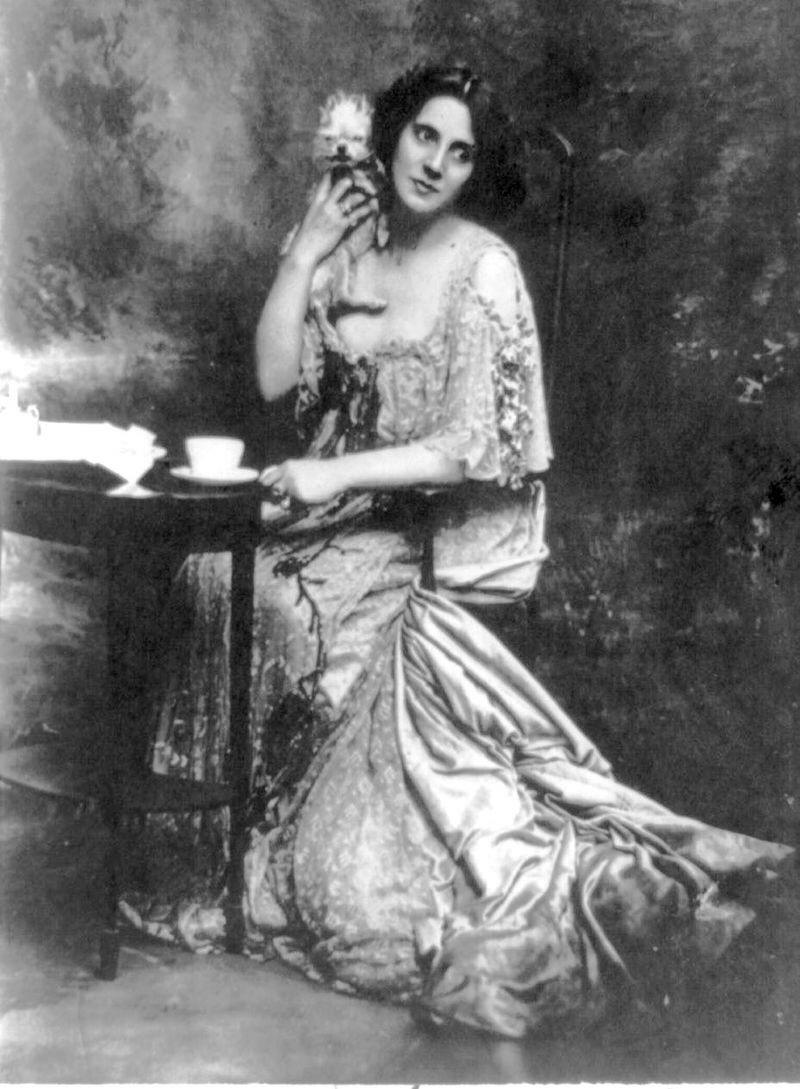
Beatrice Rose Stella Tanner was the maiden name of Mrs. Patrick Campbell
Beatrice Rose Stella Tanner modeled for The Vampire, the most
famous artwork of Philip Bourne-Jones. She acted with the stage name Mrs.
Patrick Campbell or Mrs. Pat. In 1914, she played Eliza Doolittle in the
original West End production of Pygmalion, which George Bernard Shaw
had expressly written for her.
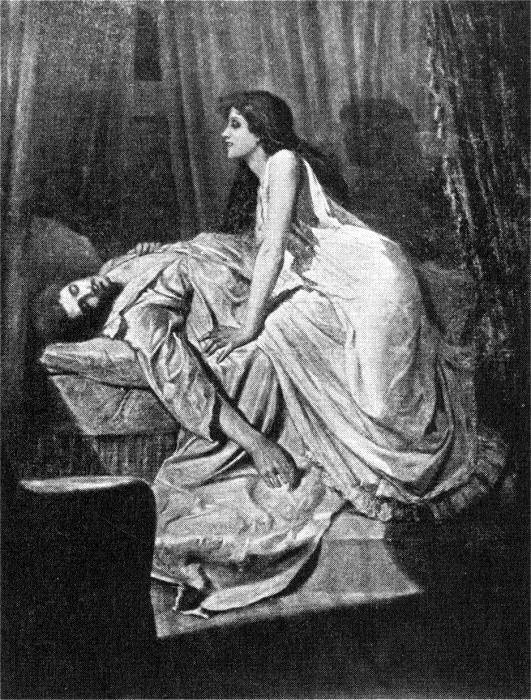
The Vampire, the most famous artwork of Philip Bourne-Jones, circa
1897.
The Vampire
by Rudyard Kipling
The verses—as suggested by the painting by Philip Burne-Jones,
first exhibited at the new gallery in London in 1897.
A fool there was and he made his prayer
(Even as you or I!)
To a rag and a bone and a hank of hair,
(We called her the woman who did not care),
But the fool he called her his lady fair—
(Even as you or I!)
Oh, the years we waste and the tears we waste,
And the work of our head and hand
Belong to the woman who did not know
(And now we know that she never could know)
And did not understand!
A fool there was and his goods he spent,
(Even as you or I!)
Honour and faith and a sure intent
(And it wasn't the least what the lady meant),
But a fool must follow his natural bent
(Even as you or I!)
Oh, the toil we lost and the spoil we lost
And the excellent things we planned
Belong to the woman who didn't know why
(And now we know that she never knew why)
And did not understand!
The fool was stripped to his foolish hide,
(Even as you or I!)
Which she might have seen when she threw him aside—
(But it isn't on record the lady tried)
So some of him lived but the most of him died—
(Even as you or I!)
And it isn't the shame and it isn't the blame
That stings like a white-hot brand—
It's coming to know that she never knew why
(Seeing, at last, she could never know why)
And never could understand!
The Unreturning
by Wilfred Owen
Suddenly night crushed out the day and hurled
Her remnants over cloud-peaks, thunder-walled.
Then fell a stillness such as harks appalled
When far-gone dead return upon the world.
There watched I for the Dead; but no ghost woke.
Each one whom Life exiled I named and called.
But they were all too far, or dumbed, or thralled,
And never one fared back to me or spoke.
Then peered the indefinite unshapen dawn
With vacant gloaming, sad as half-lit minds,
The weak-limned hour when sick men's sighs are drained.
And while I wondered on their being withdrawn,
Gagged by the smothering Wing which none unbinds,
I dreaded even a heaven with doors so chained.
Sea Fevers
by Agnes Wathall
No ancient mariner I,
Hawker of public crosses,
Snaring the passersby
With my necklace of albatrosses.
I blink no glittering eye
Between tufts of gray sea mosses
Nor in the high road ply
My trade of guilts and glosses.
But a dark and inward sky
Tracks the flotsam of my losses.
No more becalmed to lie,
The skeleton ship tosses.
The Listeners
by Walter De La Mare
'Is there anybody there?' said the Traveller,
Knocking on the moonlit door;
And his horse in the silence champed the grasses
Of the forest's ferny floor:
And a bird flew up out of the turret,
Above the Traveller's head
And he smote upon the door again a second time;
'Is there anybody there?' he said.
But no one descended to the Traveller;
No head from the leaf-fringed sill
Leaned over and looked into his grey eyes,
Where he stood perplexed and still.
But only a host of phantom listeners
That dwelt in the lone house then
Stood listening in the quiet of the moonlight
To that voice from the world of men:
Stood thronging the faint moonbeams on the dark stair,
That goes down to the empty hall,
Hearkening in an air stirred and shaken
By the lonely Traveller's call.
And he felt in his heart their strangeness,
Their stillness answering his cry,
While his horse moved, cropping the dark turf,
'Neath the starred and leafy sky;
For he suddenly smote on the door, even
Louder, and lifted his head:—
'Tell them I came, and no one answered,
That I kept my word,' he said.
Never the least stir made the listeners,
Though every word he spake
Fell echoing through the shadowiness of the still house
From the one man left awake:
Ay, they heard his foot upon the stirrup,
And the sound of iron on stone,
And how the silence surged softly backward,
When the plunging hoofs were gone.
Lenore
by Edgar Allan Poe
Ah broken is the golden bowl! the spirit flown forever!
Let the bell toll!—a saintly soul floats on the Stygian river;
And, Guy De Vere, hast thou no tear?—weep now or never more!
See! on yon drear and rigid bier low lies thy love, Lenore!
Come! let the burial rite be read—the funeral song be sung!—
An anthem for the queenliest dead that ever died so young—
A dirge for her the doubly dead in that she died so young.
"Wretches! ye loved her for her wealth and hated her for her pride,
"And when she fell in feeble health, ye blessed her—that she died!
"How shall the ritual, then, be read?—the requiem how be sung
"By you—by yours, the evil eye,—by yours, the slanderous tongue
"That did to death the innocent that died, and died so young?"
Peccavimus; but rave not thus! and let a Sabbath song
Go up to God so solemnly the dead may feel so wrong!
The sweet Lenore hath "gone before," with Hope, that flew beside
Leaving thee wild for the dear child that should have been thy bride—
For her, the fair and debonair, that now so lowly lies,
The life upon her yellow hair but not within her eyes—
The life still there, upon her hair—the death upon her eyes.
"Avaunt! to-night my heart is light. No dirge will I upraise,
"But waft the angel on her flight with a Pæan of old days!
"Let no bell toll!—lest her sweet soul, amid its hallowed mirth,
"Should catch the note, as it doth float up from the damnéd Earth.
"To friends above, from fiends below, the indignant ghost is riven—
"From Hell unto a high estate far up within the Heaven—
"From grief and groan, to a golden throne, beside the King of Heaven."
The Dead Village
by Edward Arlington Robinson
Here there is death. But even here, they say, —
Here where the dull sun shines this afternoon
As desolate as ever the dead moon
Did glimmer on dead Sardis, — men were gay;
And there were little children here to play,
With small soft hands that once did keep in tune
The strings that stretch from heaven, till too soon
The change came, and the music passed away.
Now there is nothing but the ghosts of things, —
No life, no love, no children, and no men;
And over the forgotten place there clings
The strange and unrememberable light
That is in dreams. The music failed, and then
God frowned, and shut the village from His sight.
The Lovemaker
by Robert Mezey
I see you in her bed,
Dark, rootless epicene,
Where a lone ghost is laid
And other ghosts convene;
And hear you moan at last
Your pleasure in the deep
Haven of her who kissed
Your blind mouth into sleep.
But body, once enthralled,
Wakes in the chains it wore,
Dishevelled, stupid, cold,
And famished as before,
And hears its paragon
Breathe in the ghostly air,
Anonymous carrion
Ravished by despair.
Lovemaker, I have felt
Desire take my part,
But lacked your constant fault
And something of your art,
And would not bend my knees
To the unmantled pride
That left you in that place,
Forever unsatisfied.
Non sum qualis eram bonae sub regno Cynarae
by Ernest Dowson
"I am not as I was under the reign of the good Cynara"—Horace
Last night, ah, yesternight, betwixt her lips and mine
There fell thy shadow, Cynara! thy breath was shed
Upon my soul between the kisses and the wine;
And I was desolate and sick of an old passion,
Yea, I was desolate and bowed my head:
I have been faithful to thee, Cynara! in my fashion.
All night upon mine heart I felt her warm heart beat,
Night-long within mine arms in love and sleep she lay;
Surely the kisses of her bought red mouth were sweet;
But I was desolate and sick of an old passion,
When I awoke and found the dawn was gray:
I have been faithful to you, Cynara! in my fashion.
I have forgot much, Cynara! gone with the wind,
Flung roses, roses riotously with the throng,
Dancing, to put thy pale, lost lilies out of mind;
But I was desolate and sick of an old passion,
Yea, all the time, because the dance was long;
I have been faithful to thee, Cynara! in my fashion.
I cried for madder music and for stronger wine,
But when the feast is finished and the lamps expire,
Then falls thy shadow, Cynara! the night is thine;
And I am desolate and sick of an old passion,
Yea, hungry for the lips of my desire:
I have been faithful to thee, Cynara! in my fashion.
Methought I Saw
by John Milton
Methought I saw my late espousèd saint
Brought to me like Alcestis from the grave,
Whom Jove's great son to her glad husband gave,
Rescued from Death by force, though pale and faint.
Mine, as whom washed from spot of childbed taint
Purification in the Old Law did save,
And such, as yet once more I trust to have
Full sight of her in Heaven without restraint,
Came vested all in white, pure as her mind.
Her face was veiled; yet to my fancied sight
Love, sweetness, goodness, in her person shined
So clear as in no face with more delight.
But O, as to embrace me she inclined,
I waked, she fled, and day brought back my night.
White Goddess
by
Michael R. Burch
White in the shadows
I see your face,
unbidden. Go, tell
Love it is commonplace;
tell Regret it is not so rare.
Our love is not here
though you smile,
full of sedulous grace.
Lost in darkness, I fear
the past is our resting place.
The Snow Man
by Wallace Stevens
One must have a mind of winter
To regard the frost and the boughs
Of the pine-trees crusted with snow;
And have been cold a long time
To behold the junipers shagged with ice,
The spruces rough in the distant glitter
Of the January sun; and not to think
Of any misery in the sound of the wind,
In the sound of a few leaves,
Which is the sound of the land
Full of the same wind
That is blowing in the same bare place
For the listener, who listens in the snow,
And, nothing himself, beholds
Nothing that is not there and the nothing that is.
Buffalo Bill's defunct
by e. e. cummings
Buffalo Bill's
defunct
who used to
ride a watersmooth-silver
stallion
and break onetwothreefourfive pigeonsjustlikethat
Jesus
he was a handsome man
and what i want to know is
how do you like your blueeyed boy
Mister Death
Vitae summa brevis spem nos vetat inchohare longam
by Ernest Dowson
"The brevity of life forbids us to entertain hopes of long duration" —Horace
They are not long, the weeping and the laughter,
Love and desire and hate:
I think they have no portion in us after
We pass the gate.
They are not long, the days of wine and roses:
Out of a misty dream
Our path emerges for a while, then closes
Within a dream.
VIII— from "Sunday Morning"
by Wallace Stevens
She hears, upon that water without sound,
A voice that cries, "The tomb in Palestine
Is not the porch of spirits lingering.
It is the grave of Jesus, where he lay."
We live in an old chaos of the sun,
Or old despondency of day and night,
Or island solitude, unsponsored, free,
Of that wide water, inescapable.
Deer walk upon our mountains, and the quail
Whistle about us their spontaneous cries;
Sweet berries ripen in the wilderness;
And, in the isolation of the sky,
At evening, casual flocks of pigeons make
Ambiguous undulations as they sink,
Downward to darkness, on extended wings.
Easter Hymn
by A. E. Housman
If in that Syrian garden, ages slain,
You sleep, and know not you are dead in vain,
Nor even in dreams behold how dark and bright
Ascends in smoke and fire by day and night
The hate you died to quench and could but fan,
Sleep well and see no morning, son of man.
But if, the grave rent and the stone rolled by,
At the right hand of majesty on high
You sit, and sitting so remember yet
Your tears, your agony and bloody sweat,
Your cross and passion and the life you gave,
Bow hither out of heaven and see and save.
The Bustle In A House
by Emily Dickinson
The bustle in a house
The morning after death
Is solemnest of industries
Enacted upon earth.
The sweeping up the heart
And putting love away
We shall not want to use again
Until eternity.
The Broken Tower
by Hart Crane
The bell-rope that gathers God at dawn
Dispatches me as though I dropped down the knell
Of a spent day—to wander the cathedral lawn
From pit to crucifix, feet chill on steps from hell.
Have you not heard, have you not seen that corps
Of shadows in the tower, whose shoulders sway
Antiphonal carillons launched before
The stars are caught and hived in the sun's ray?
The bells, I say, the bells break down their tower;
And swing I know not where. Their tongues engrave
Membrane through marrow, my long-scattered score
Of broken intervals ... And I, their sexton slave!
Oval encyclicals in canyons heaping
The impasse high with choir. Banked voices slain!
Pagodas, campaniles with reveilles out leaping —
O terraced echoes prostrate on the plain! ...
And so it was I entered the broken world
To trace the visionary company of love, its voice
An instant in the wind (I know not whither hurled)
But not for long to hold each desperate choice.
My word I poured. But was it cognate, scored
Of that tribunal monarch of the air
Whose thighs embronzes earth, strikes crystal Word
In wounds pledged once to hope—cleft to despair?
The steep encroachments of my blood left me
No answer (could blood hold such a lofty tower
As flings the question true?)—or is it she
Whose sweet mortality stirs latent power? —
And through whose pulse I hear, counting the strokes
My veins recall and add, revived and sure
The angelus of wars my chest evokes:
What I hold healed, original now, and pure ...
And builds, within, a tower that is not stone
(Not stone can jacket heaven)—but slip
Of pebbles,—visible wings of silence sown
In azure circles, widening as they dip
The matrix of the heart, lift down the eyes
That shrines the quiet lake and swells a tower ...
The commodious, tall decorum of that sky
Unseals her earth, and lifts love in its shower.
At Melville's Tomb
by Hart Crane
Often beneath the wave, wide from this ledge
The dice of drowned men's bones he saw bequeath
An embassy. Their numbers as he watched,
Beat on the dusty shore and were obscured.
And wrecks passed without sound of bells,
The calyx of death's bounty giving back
A scattered chapter, livid hieroglyph,
The portent wound in corridors of shells.
Then in the circuit calm of one vast coil,
Its lashings charmed and malice reconciled,
Frosted eyes there were that lifted altars;
And silent answers crept across the stars.
Compass, quadrant and sextant contrive
No farther tides ... High in the azure steeps
Monody shall not wake the mariner.
This fabulous shadow only the sea keeps.
Haunted Houses
by Henry Wadsworth Longfellow
All houses wherein men have lived and died
Are haunted houses. Through the open doors
The harmless phantoms on their errands glide,
With feet that make no sound upon the floors.
We meet them at the door-way, on the stair,
Along the passages they come and go,
Impalpable impressions on the air,
A sense of something moving to and fro.
There are more guests at table than the hosts
Invited; the illuminated hall
Is thronged with quiet, inoffensive ghosts,
As silent as the pictures on the wall.
The stranger at my fireside cannot see
The forms I see, nor hear the sounds I hear;
He but perceives what is; while unto me
All that has been is visible and clear.
We have no title-deeds to house or lands;
Owners and occupants of earlier dates
From graves forgotten stretch their dusty hands,
And hold in mortmain still their old estates.
The spirit-world around this world of sense
Floats like an atmosphere, and everywhere
Wafts through these earthly mists and vapours dense
A vital breath of more ethereal air.
Our little lives are kept in equipoise
By opposite attractions and desires;
The struggle of the instinct that enjoys,
And the more noble instinct that aspires.
These perturbations, this perpetual jar
Of earthly wants and aspirations high,
Come from the influence of an unseen star
An undiscovered planet in our sky.
And as the moon from some dark gate of cloud
Throws o'er the sea a floating bridge of light,
Across whose trembling planks our fancies crowd
Into the realm of mystery and night,—
So from the world of spirits there descends
A bridge of light, connecting it with this,
O'er whose unsteady floor, that sways and bends,
Wander our thoughts above the dark abyss.
The Vampire
by Conrad Aiken
She rose among us where we lay.
She wept, we put our work away.
She chilled our laughter, stilled our play;
And spread a silence there.
And darkness shot across the sky,
And once, and twice, we heard her cry;
And saw her lift white hands on high
And toss her troubled hair.
What shape was this who came to us,
With basilisk eyes so ominous,
With mouth so sweet, so poisonous,
And tortured hands so pale?
We saw her wavering to and fro,
Through dark and wind we saw her go;
Yet what her name was did not know;
And felt our spirits fail.
We tried to turn away; but still
Above we heard her sorrow thrill;
And those that slept, they dreamed of ill
And dreadful things:
Of skies grown red with rending flames
And shuddering hills that cracked their frames;
Of twilights foul with wings;
And skeletons dancing to a tune;
And cries of children stifled soon;
And over all a blood-red moon
A dull and nightmare size.
They woke, and sought to go their ways,
Yet everywhere they met her gaze,
Her fixed and burning eyes.
Who are you now, —we cried to her—
Spirit so strange, so sinister?
We felt dead winds above us stir;
And in the darkness heard
A voice fall, singing, cloying sweet,
Heavily dropping, though that heat,
Heavy as honeyed pulses beat,
Slow word by anguished word.
And through the night strange music went
With voice and cry so darkly blent
We could not fathom what they meant;
Save only that they seemed
To thin the blood along our veins,
Foretelling vile, delirious pains,
And clouds divulging blood-red rains
Upon a hill undreamed.
And this we heard: "Who dies for me,
He shall possess me secretly,
My terrible beauty he shall see,
And slake my body's flame.
But who denies me cursed shall be,
And slain, and buried loathsomely,
And slimed upon with shame."
And darkness fell. And like a sea
Of stumbling deaths we followed, we
Who dared not stay behind.
There all night long beneath a cloud
We rose and fell, we struck and bowed,
We were the ploughman and the ploughed,
Our eyes were red and blind.
And some, they said, had touched her side,
Before she fled us there;
And some had taken her to bride;
And some lain down for her and died;
Who had not touched her hair,
Ran to and fro and cursed and cried
And sought her everywhere.
"Her eyes have feasted on the dead,
And small and shapely is her head,
And dark and small her mouth," they said,
"And beautiful to kiss;
Her mouth is sinister and red
As blood in moonlight is."
Then poets forgot their jeweled words
And cut the sky with glittering swords;
And innocent souls turned carrion birds
To perch upon the dead.
Sweet daisy fields were drenched with death,
The air became a charnel breath,
Pale stones were splashed with red.
Green leaves were dappled bright with blood
And fruit trees murdered in the bud;
And when at length the dawn
Came green as twilight from the east,
And all that heaving horror ceased,
Silent was every bird and beast,
And that dark voice was gone.
No word was there, no song, no bell,
No furious tongue that dream to tell;
Only the dead, who rose and fell
Above the wounded men;
And whisperings and wails of pain
Blown slowly from the wounded grain,
Blown slowly from the smoking plain;
And silence fallen again.
Until at dusk, from God knows where,
Beneath dark birds that filled the air,
Like one who did not hear or care,
Under a blood-red cloud,
An aged ploughman came alone
And drove his share through flesh and bone,
And turned them under to mould and stone;
All night long he ploughed.
The Vampyre
by John Stagg
"Why looks my lord so deadly pale?
Why fades the crimson from his cheek?
What can my dearest husband ail?
Thy heartfelt cares, O Herman, speak!
"Why, at the silent hour of rest,
Dost thou in sleep so sadly mourn?
Has tho' with heaviest grief oppress'd,
Griefs too distressful to be borne.
"Why heaves thy breast? — why throbs thy heart?
O speak! and if there be relief
Thy Gertrude solace shall impart,
If not, at least shall share thy grief.
"Wan is that cheek, which once the bloom
Of manly beauty sparkling shew'd;
Dim are those eyes, in pensive gloom,
That late with keenest lustre glow'd.
"Say why, too, at the midnight hour,
You sadly pant and tug for breath,
As if some supernat'ral pow'r
Were pulling you away to death?
"Restless, tho' sleeping, still you groan,
And with convulsive horror start;
O Herman! to thy wife make known
That grief which preys upon thy heart."
"O Gertrude! how shall I relate
Th' uncommon anguish that I feel;
Strange as severe is this my fate, —
A fate I cannot long conceal.
"In spite of all my wonted strength,
Stern destiny has seal'd my doom;
The dreadful malady at length
Wil drag me to the silent tomb!"
"But say, my Herman, what's the cause
Of this distress, and all thy care.
That, vulture-like, thy vitals gnaws,
And galls thy bosom with despair?
"Sure this can be no common grief,
Sure this can be no common pain?
Speak, if this world contain relief,
That soon thy Gertrude shall obtain."
"O Gertrude, 'tis a horrid cause,
O Gertrude, 'tis unusual care,
That, vulture-like, my vitals gnaws,
And galls my bosom with despair.
"Young Sigismund, my once dear friend,
But lately he resign'd his breath;
With others I did him attend
Unto the silent house of death.
"For him I wept, for him I mourn'd,
Paid all to friendship that was due;
But sadly friendship is return'd,
Thy Herman he must follow too!
"Must follow to the gloomy grave,
In spite of human art or skill;
No pow'r on earth my life can save,
'Tis fate's unalterable will!
"Young Sigismund, my once dear friend,
But now my persecutor foul,
Doth his malevolence extend
E'en to the torture of my soul.
"By night, when, wrapt in soundest sleep,
All mortals share a soft repose,
My soul doth dreadful vigils keep,
More keen than which hell scarely knows.
"From the drear mansion of the tomb,
From the low regions of the dead,
The ghost of Sigismund doth roam,
And dreadful haunts me in my bed!
"There, vested in infernal guise,
(By means to me not understood,)
Close to my side the goblin lies,
And drinks away my vital blood!
"Sucks from my veins the streaming life,
And drains the fountain of my heart!
O Gertrude, Gertrude! dearest wife!
Unutterable is my smart.
"When surfeited, the goblin dire,
With banqueting by suckled gore,
Will to his sepulchre retire,
Till night invites him forth once more.
"Then will he dreadfully return,
And from my veins life's juices drain;
Whilst, slumb'ring, I with anguish mourn,
And toss with agonizing pain!
"Already I'm exhausted, spent;
His carnival is nearly o'er,
My soul with agony is rent,
To-morrow I shall be no more!
"But, O my Gertrude! dearest wife!
The keenest pangs hath last remain'd—
When dead, I too shall seek thy life,
Thy blood by Herman shall be drain'd!
"But to avoid this horrid fate,
Soon as I'm dead and laid in earth,
Drive thro' my corpse a jav'lin straight; —
This shall prevent my coming forth.
"O watch with me, this last sad night,
Watch in your chamber here alone,
But carefully conceal the light
Until you hear my parting groan.
"Then at what time the vesper-bell
Of yonder convent shall be toll'd,
That peal shall ring my passing knell,
And Herman's body shall be cold!
"Then, and just then, thy lamp make bare,
The starting ray, the bursting light,
Shall from my side the goblin scare,
And shew him visible to sight!"
The live-long night poor Gertrude sate,
Watch'd by her sleeping, dying lord;
The live-long night she mourn'd his fate,
The object whom her soul ador'd.
Then at what time the vesper-bell
Of yonder convent sadly toll'd,
The, then was peal'd his passing knell,
The hapless Herman he was cold!
Just at that moment Gertrude drew
From 'neath her cloak the hidden light;
When, dreadful! she beheld in view
The shade of Sigismund! — sad sight!
Indignant roll'd his ireful eyes,
That gleam'd with wild horrific stare;
And fix'd a moment with surprise,
Beheld aghast th' enlight'ning glare.
His jaws cadaverous were besmear'd
With clott'd carnage o'er and o'er,
And all his horrid whole appear'd
Distent, and fill'd with human gore!
With hideous scowl the spectre fled;
She shriek'd aloud; — then swoon'd away!
The hapless Herman in his bed,
All pale, a lifeless body lay!
Next day in council 'twas decree,
(Urg'd at the instance of the state,)
That shudd'ring nature should be freed
From pests like these ere 'twas too late.
The choir then burst the fun'ral dome
Where Sigismund was lately laid,
And found him, tho' within the tomb,
Still warm as life, and undecay'd.
With blood his visage was distain'd,
Ensanguin'd were his frightful eyes,
Each sign of former life remain'd,
Save that all motionless he lies.
The corpse of Herman they contrive
To the same sepulchre to take,
And thro' both carcases they drive,
Deep in the earth, a sharpen'd stake!
By this was finish'd their career,
Thro' this no longer they can roam;
From them their friends have nought to fear,
Both quiet keep the slumb'ring tomb.
Here are more great vampire/ghost stories and other eerie, haunting Halloween poems:
The Vampire Bride by Henry Thomas Liddell
The Bride of Corinth by Johann Wolfgang von Goethe
The Highwayman
by Alfred Noyes
Lamia by John Keats
La Belle Dame sans Merci by John Keats
Mariana by Lord Alfred Tennyson
The Apparition by John Donne
Goblin Market by Christina Rossetti
The Blessed Damozel by Dante Gabriel Rossetti
Lilith by Dante Gabriel Rossetti
Sudden Light by Dante Gabriel Rossetti
Allayne by Kevin N. Roberts
Halloween by Robert Burns
Ghost House by Robert Frost
Low Barometer by Robert Bridges
My Hero Bares His Nerves by Dylan Thomas
The Raven by Edgar Allan Poe
Annabel Lee by Edgar Allan Poe
The Haunted Palace by Edgar Allan Poe
Spirits of the Dead by Edgar Allan Poe
The White Witch by James Weldon Johnson
The Hag by Robert Herrick
We're All Ghosts Now by Dara Weir
Shadwell Stair by Wilfred Owen
When You Are Old by William Butler Yeats
the Cambridge ladies who live in furnished souls
by e. e. cummings
The Convergence Of The Twain
by Thomas Hardy
Cold-Blooded Creatures
by Elinor Morton Wylie
Anthem For Doomed Youth
by Wilfred Owen
The Neophyte by Aleister Crowley
The Poor Ghost by Christina Rossetti
The Joyful Corpse by Charles Baudelaire
The Shadow of Lilith by Christopher John Brennan
The Vampire by Madison Julius Cawein
Bats Ultrasound by Les Murray
Der Vampir by Heinrich August Ossenfelder
Related pages: The Best Vampire Poetry,
The Best Dark Poetry,
The Best Dark Christmas Poems,
The Best Halloween Poetry,
The Best Supernatural Poetry,
The Best Elegies, Dirges & Laments
The HyperTexts





























